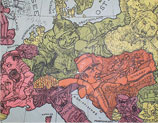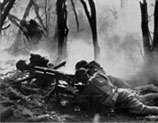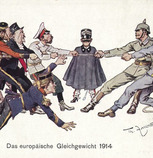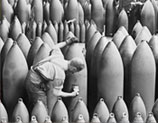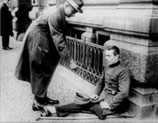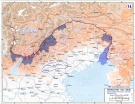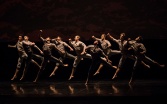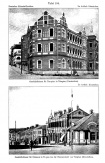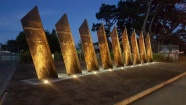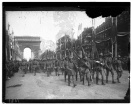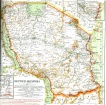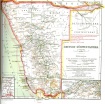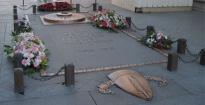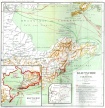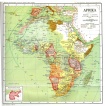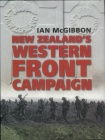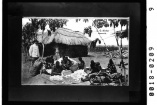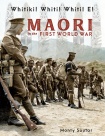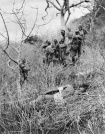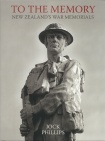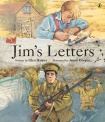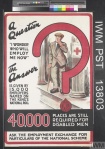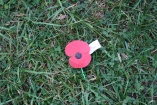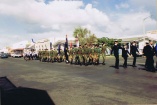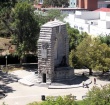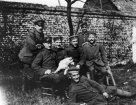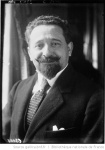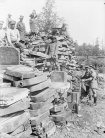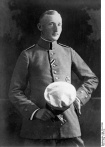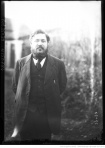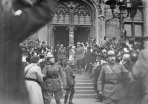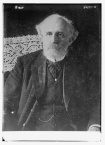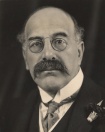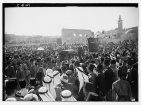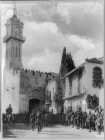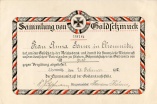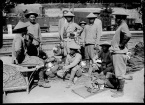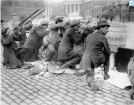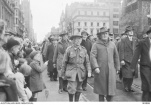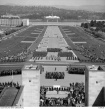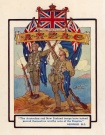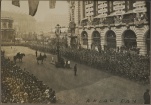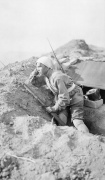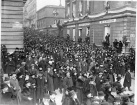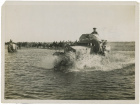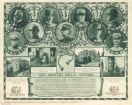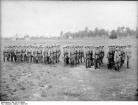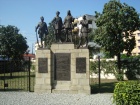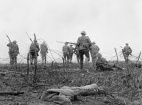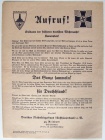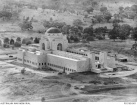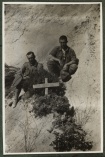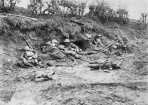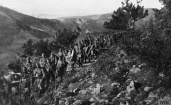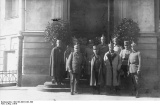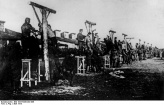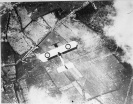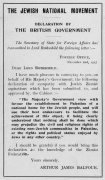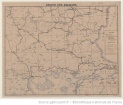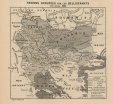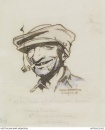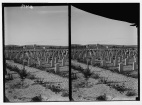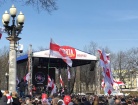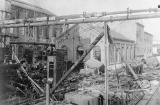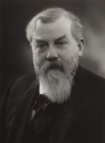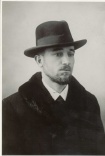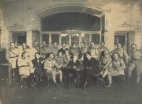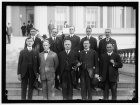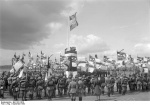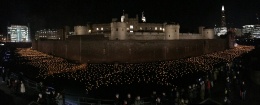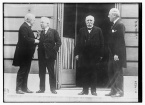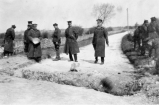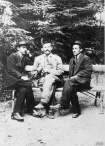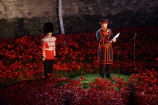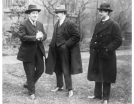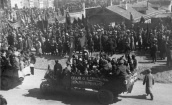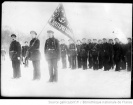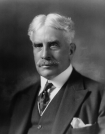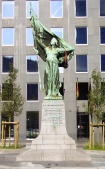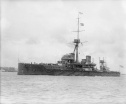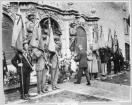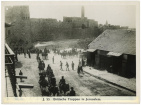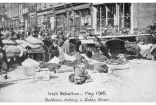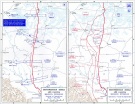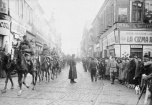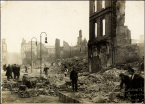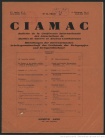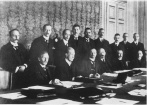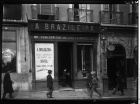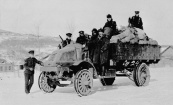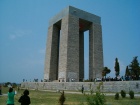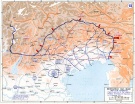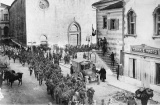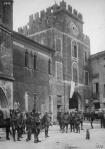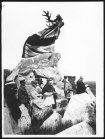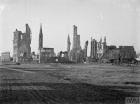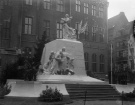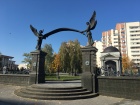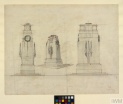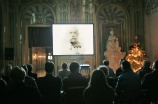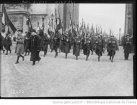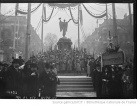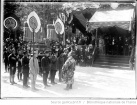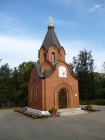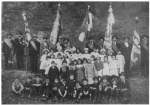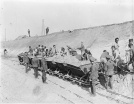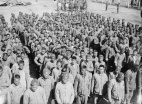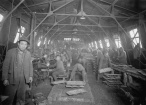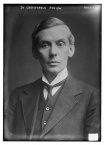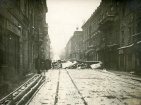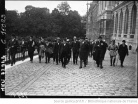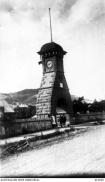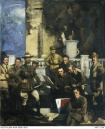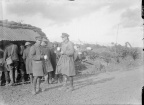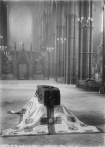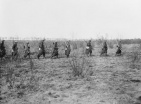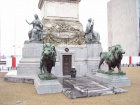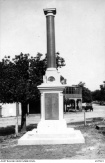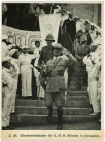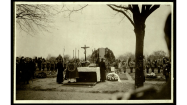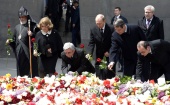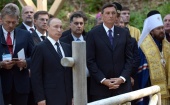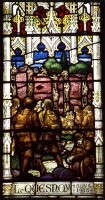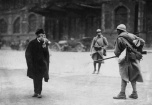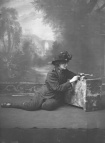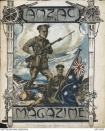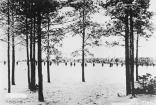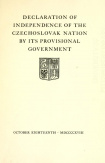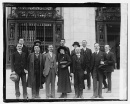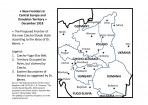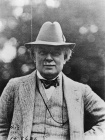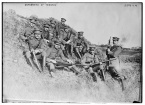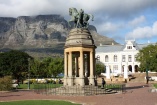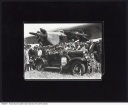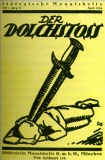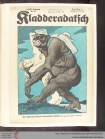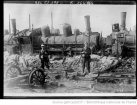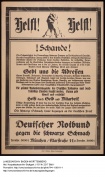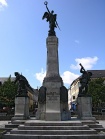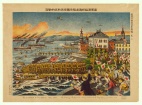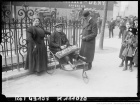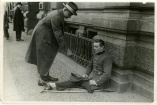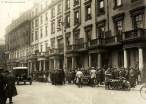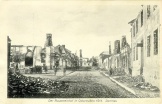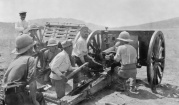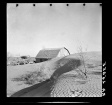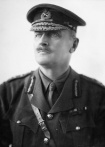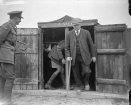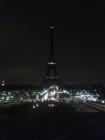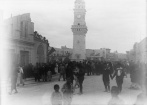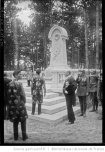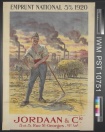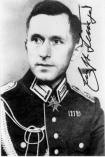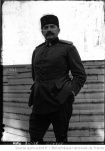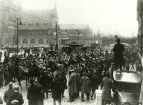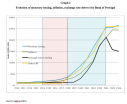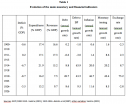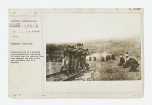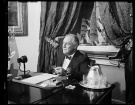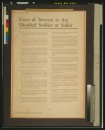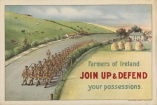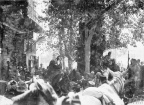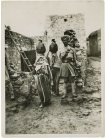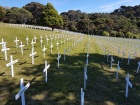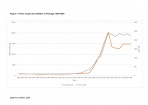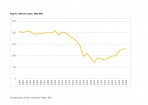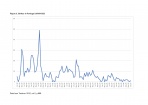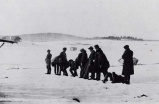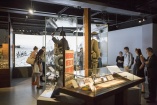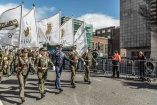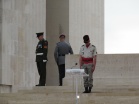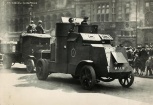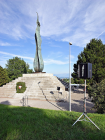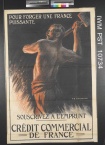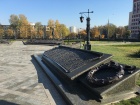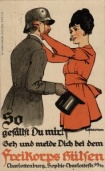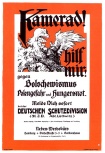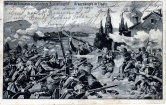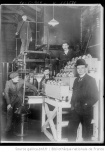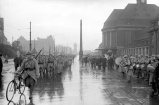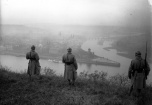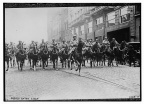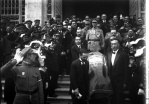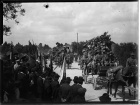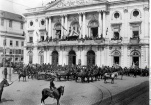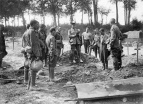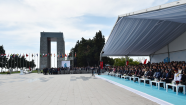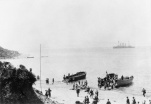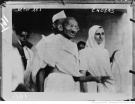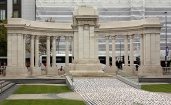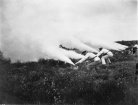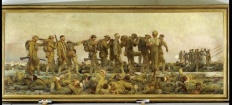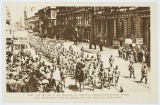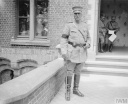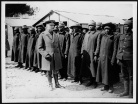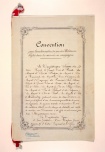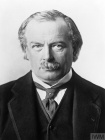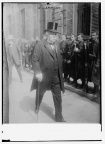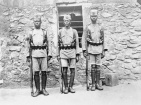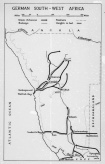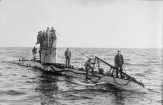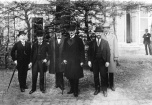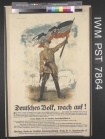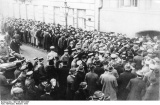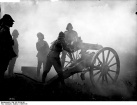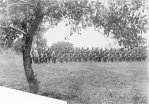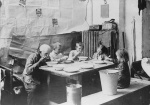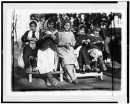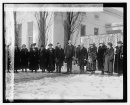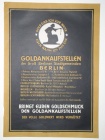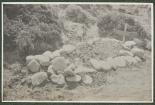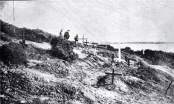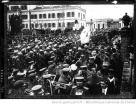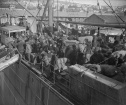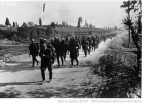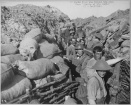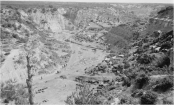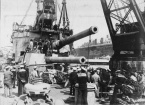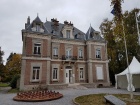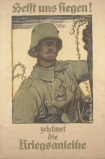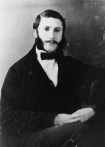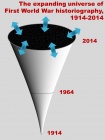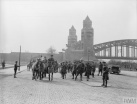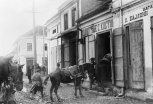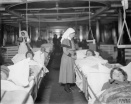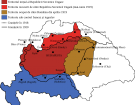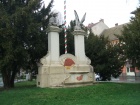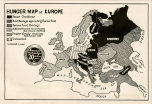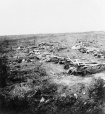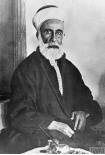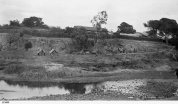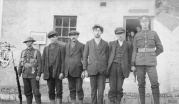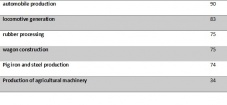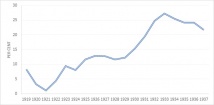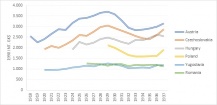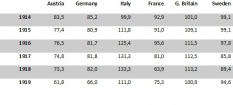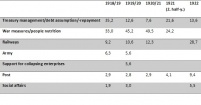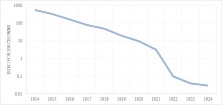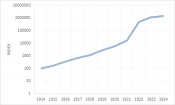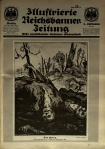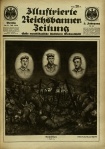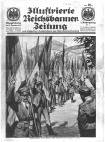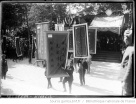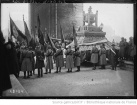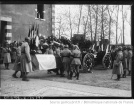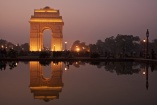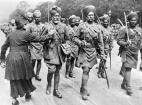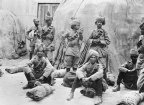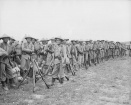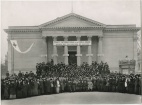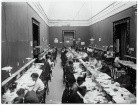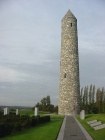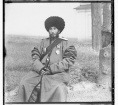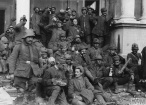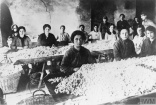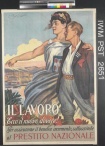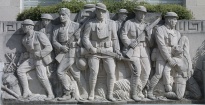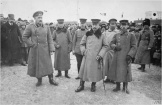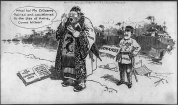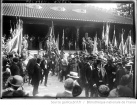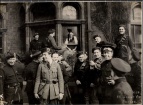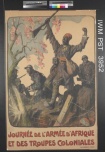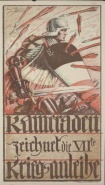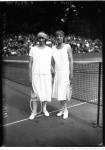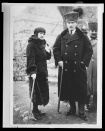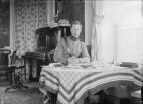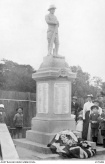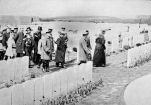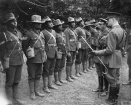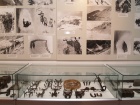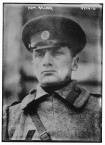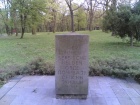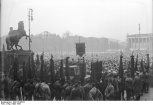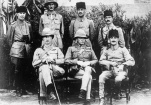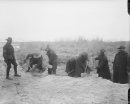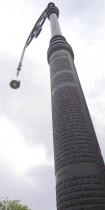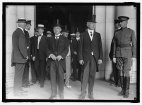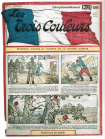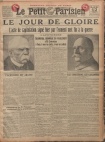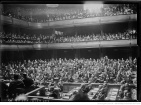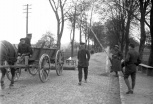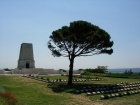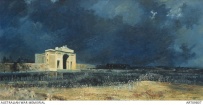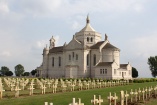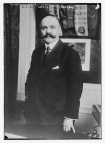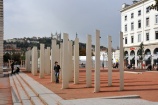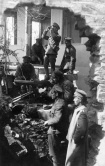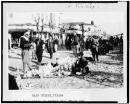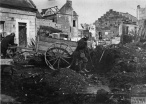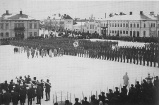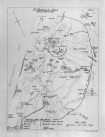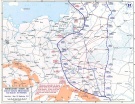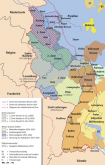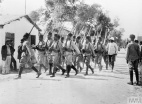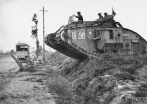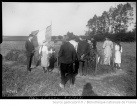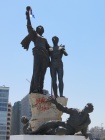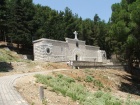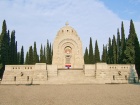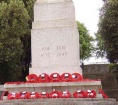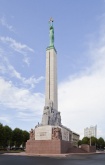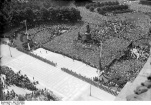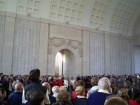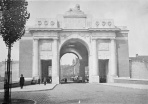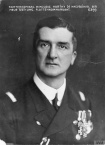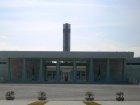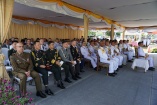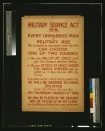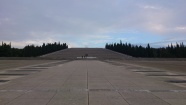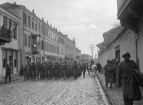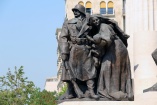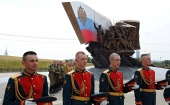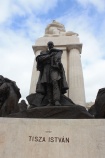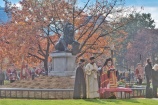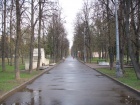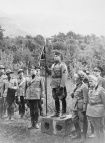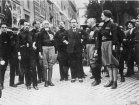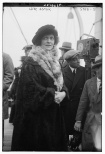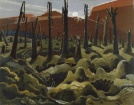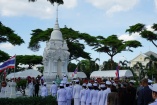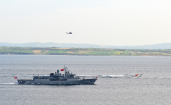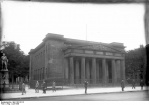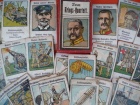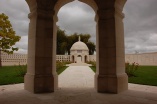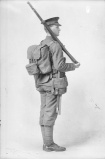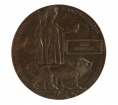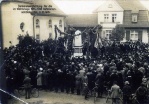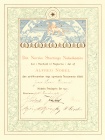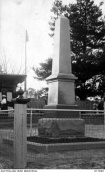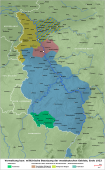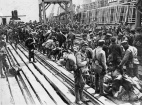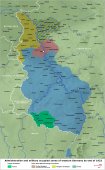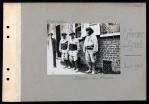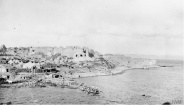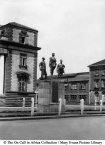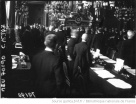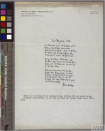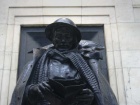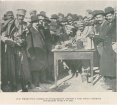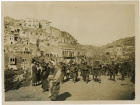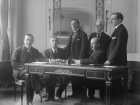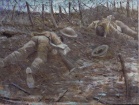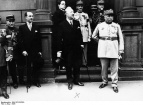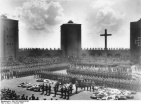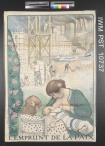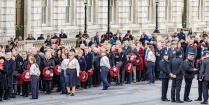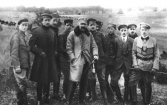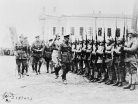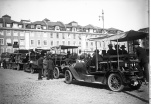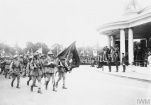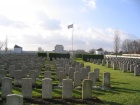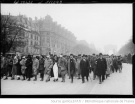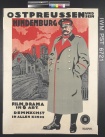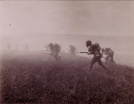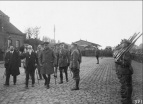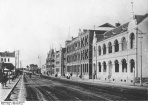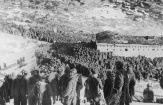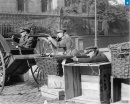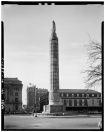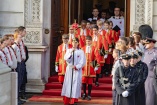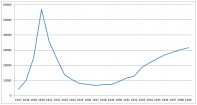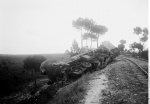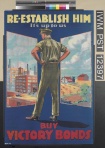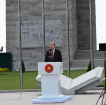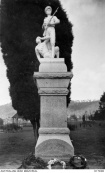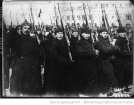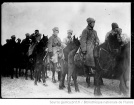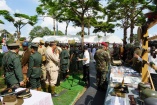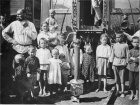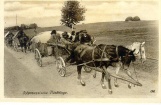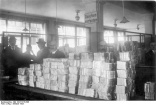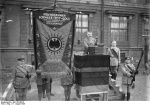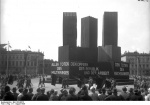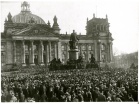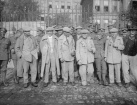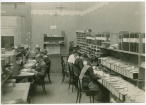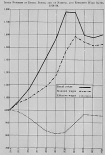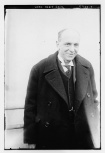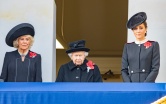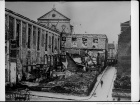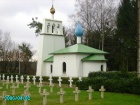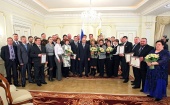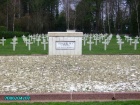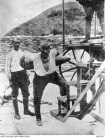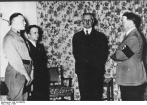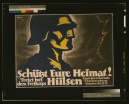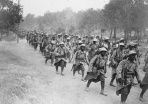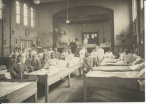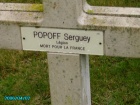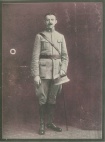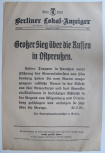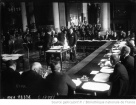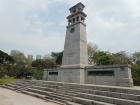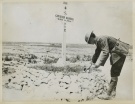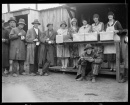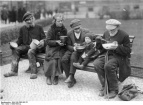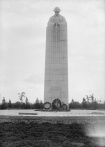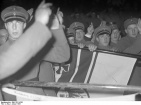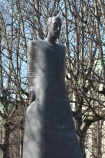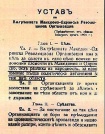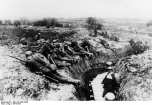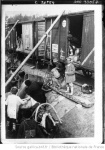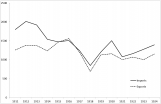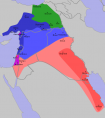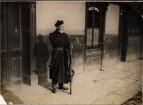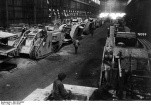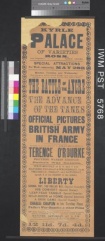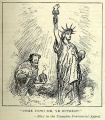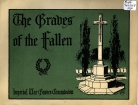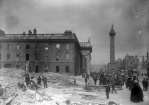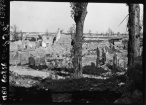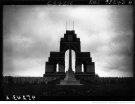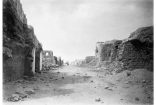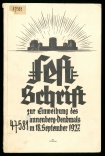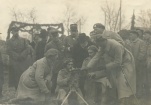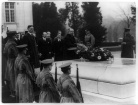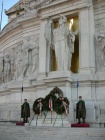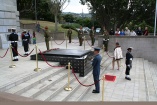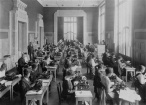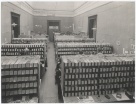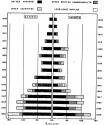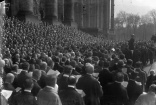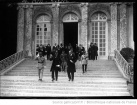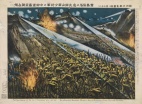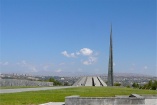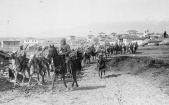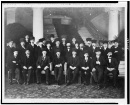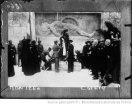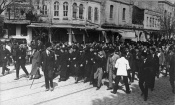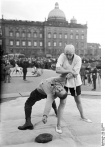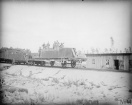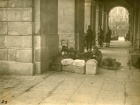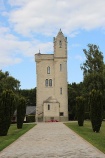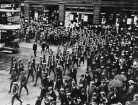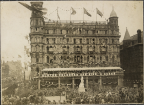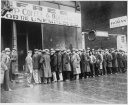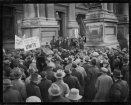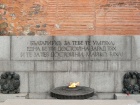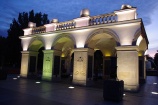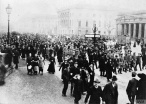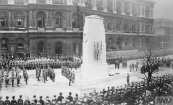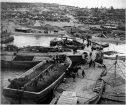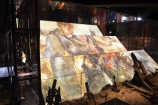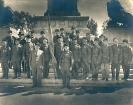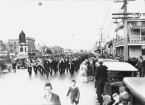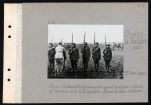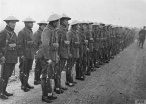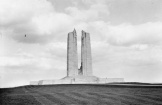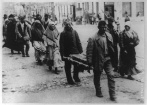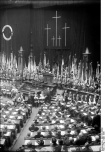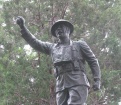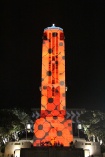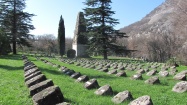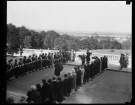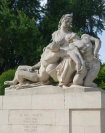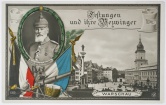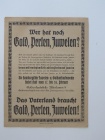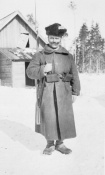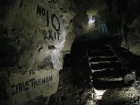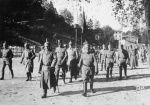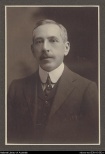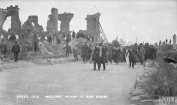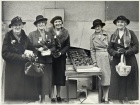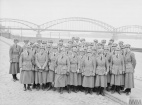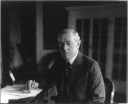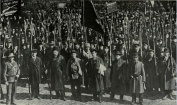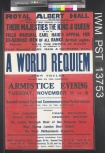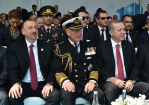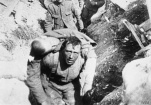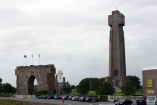Themes Post-war
Survey Articles (Thematic)
- Centenary (Battlefield Tourism)
- Centenary (Computer Games)
- Centenary (Education, Pedagogy, Youth Programs)
- Centenary (Historiography)
- Centenary (Internet)
- Centenary (Libraries)
- Centenary (Monuments and Memorials)
- Centenary (Museums)
- Centenary (Visual Arts)
- Colonial Empires after the War/Decolonization
- Commemoration, Cult of the Fallen
- Demobilization
- Fascism and the Radical Right
- Hero Cult
- Historiography 1918-Today
- Influenza Pandemic
- International Labour Organization
- League of Nations
- Memory of the War: Popular Memory 1918-1945, 1945 to the Present
- Military Lessons of the First World War
- Museums
- Post-war Economies
- Post-war Societies
- Post-war Welfare Policies
- Russian Civil War
- The Historiography of the Origins of the First World War
- The Paris Peace Conference and its Consequences
- Veterans' Associations
- War Finance and Monetary Consequences: The German Case Revisited
Regional Thematic Articles
- Arab Historiography 1918-Today
- Bereavement and Mourning (Australia)
- Bereavement and Mourning, Commemoration and Cult of the Fallen (Austria-Hungary)
- Bereavement and Mourning, Commemoration and Cult of the Fallen (France)
- Centenary (Armenia)
- Centenary (Australia)
- Centenary (Belarus)
- Centenary (Belgium)
- Centenary (Bulgaria)
- Centenary (Canada)
- Centenary (China)
- Centenary (Czech Republic)
- Centenary (France)
- Centenary (Germany)
- Centenary (Hungary)
- Centenary (Indian Subcontinent)
- Centenary (Ireland)
- Centenary (Israel/Palestine)
- Centenary (Italy)
- Centenary (Japan)
- Centenary (Madagascar)
- Centenary (New Zealand)
- Centenary (Poland)
- Centenary (Poland)
- Centenary (Portugal)
- Centenary (Romania)
- Centenary (Russia)
- Centenary (Serbia)
- Centenary (Singapore)
- Centenary (Slovakia)
- Centenary (Slovenia)
- Centenary (South Africa)
- Centenary (Switzerland)
- Centenary (Thailand)
- Centenary (The Netherlands)
- Centenary (Turkey)
- Centenary (Ukraine)
- Centenary (United Kingdom)
- Centenary (USA)
- Colonial Warfare and Occupation (Africa)
- Commemoration and Cult of the Fallen (Canada)
- Commemoration and Remembrance (USA)
- Commemoration, Cult of the Fallen (Africa)
- Commemoration, Cult of the Fallen (Australia)
- Commemoration, Cult of the Fallen (Belgium)
- Commemoration, Cult of the Fallen (East Central Europe)
- Commemoration, Cult of the Fallen (Germany)
- Commemoration, Cult of the Fallen (Great Britain and Ireland)
- Commemoration, Cult of the Fallen (India)
- Commemoration, Cult of the Fallen (Indochina)
- Commemoration, Cult of the Fallen (Newfoundland)
- Commemoration, Cult of the Fallen (New Zealand)
- Commemoration, Cult of the Fallen (Russian Empire)
- Commemoration, Cult of the Fallen (South East Europe)
- Commemoration, Cult of the Fallen (Union of South Africa)
- Commemoration (Switzerland)
- Film/Cinema (Great Britain)
- Historiography 1918-Today (Africa)
- Historiography 1918-Today (Australia)
- Historiography 1918-Today (Austria-Hungary)
- Historiography 1918-Today (Belgium)
- Historiography 1918-Today: Bulgaria (South East Europe)
- Historiography 1918-Today (Canada)
- Historiography 1918-Today (China)
- Historiography 1918-Today (East Central Europe)
- Historiography 1918-Today (France)
- Historiography 1918-Today (Germany)
- Historiography 1918-Today (Great Britain)
- Historiography 1918-Today (India)
- Historiography 1918-Today (Ireland)
- Historiography 1918-Today (Italy)
- Historiography 1918-Today (Japan)
- Historiography 1918-Today (Latin America)
- Historiography 1918-Today (Middle East/Arab Lands)
- Historiography 1918-Today (New Zealand)
- Historiography 1918-Today (Portugal)
- Historiography 1918-Today (Russian Empire)
- Historiography 1918-Today: Serbia and Montenegro (South East Europe)
- Historiography 1918-Today (Switzerland)
- Historiography 1918-Today (Union of South Africa)
- Historiography 1918-Today (USA)
- Influenza Pandemic (Africa)
- International Committee of the Red Cross
- International Responses to the Russian Civil War (Russian Empire)
- Jewish Responses to the War (East Central Europe)
- Mourning and Cult of the Fallen (Italy)
- Mourning and Cult of the Fallen (Portugal)
- Occupation after the War (Belgium and France)
- Occupation during and after the War (Austria-Hungary)
- Occupation during and after the War (China)
- Occupation during and after the War (East Central Europe)
- Occupation during and after the War (Germany)
- Occupation during and after the War (Italy)
- Occupation during and after the War (Middle East)
- Occupation during and after the War (Ottoman Empire)
- Occupation during and after the War (Russian Empire)
- Occupation during and after the War (South East Europe)
- Perspective of an Insider: Centenary (United Kingdom)
- Polish War Myths (East Central Europe)
- Post-war Agrarian Economic Policies (East Central Europe)
- Post-war Colonial Administration (Africa)
- Post-war Conflict (Great Britain and Ireland)
- Post-war Economies (Africa)
- Post-war Economies (Australia)
- Post-war Economies (Austria-Hungary)
- Post-war Economies (Belgium)
- Post-war Economies (East Central Europe)
- Post-war Economies (France)
- Post-war Economies (Germany)
- Post-war Economies (Great Britain and Ireland)
- Post-war Economies (Italy)
- Post-war Economies (Latin America)
- Post-war Economies (Middle East)
- Post-war Economies (New Zealand)
- Post-war Economies (Portugal)
- Post-war Economies (Russian Empire)
- Post-war Economies (South East Europe)
- Post-war Economies (Turkey)
- Post-war Economies (USA)
- Post-war Military Action and Violence (East Central Europe)
- Post-war Political Consequences (Portugal)
- Post-war Settlement (Portugal)
- Post-war Societies (Africa)
- Post-war Societies (Australia)
- Post-war Societies (Austria)
- Post-war Societies (Belgium)
- Post-war Societies (Czechoslovakia)
- Post-war Societies (East Central Europe)
- Post-war Societies (France)
- Post-war Societies (Germany)
- Post-war Societies (Great Britain and Ireland)
- Post-war Societies (India)
- Post-war Societies (Italy)
- Post-war Societies (Middle East)
- Post-war Societies (Portugal)
- Post-war Societies (Russian Empire)
- Post-war Societies (South East Europe)
- Post-war Societies (Turkey)
- Post-war Societies (USA)
- Post-war Treaties (Ottoman Empire/ Middle East)
- Post-war Turmoil and Violence (Hungary)
- Post-war Turmoil and Violence (Yugoslavia)
- Veterans' Associations (Great Britain and Ireland)
- War Finance (Portugal)
- War Memory, Commemoration (Ottoman Empire/ Middle East)
- Wartime and Post-war Economies (China)
- Wartime and Post-war Economies (Japan)
- Wartime and Post-war Economies (Switzerland)
Encyclopedic Entries
- All Quiet on the Western Front (novel)
- Alternative Visions of World Order in Post-war China
- Amritsar, Massacre of
- Anzac Memorial, Sydney
- Arditi
- Askari
- Barbusse, Henri
- Battlefield Archeology
- Bauer, Max
- Belarus
- Beneš, Edvard
- Black and Tans and Auxiliaries
- Borms, August
- Brändström, Elsa
- Brazil
- Briand, Aristide
- British Mandate for Palestine
- Bureau of Investigation
- Cavid Bey, Mehmed
- Cendrars, Blaise
- Cenotaph
- Centenary (Archives)
- Centenary (Austria)
- Centenary (Film/Cinema)
- Centenary (Literature)
- Centenary (Social Media)
- Collins, Michael
- Cossacks
- Croix de Feu
- Czechoslovak-Hungarian Border Conflict
- Czechoslovak Legions (Russian Empire)
- D'Annunzio, Gabriele
- Denikin, Anton Ivanovich
- De Valera, Éamon
- Discussion: Humanitarianism
- Dix, Otto
- Emigration (Russian Empire)
- Eupen-Malmedy
- Finnish Civil War 1918
- Fiume
- French Mandate for Syria and Lebanon
- Freud, Sigmund
- Gabrys, Juozas
- German Communities and their Expulsion (Belgium)
- Goltz, Rüdiger Graf von der
- Göring, Hermann
- Groener, Wilhelm
- Grosz, George
- Haller, Józef
- Hemingway, Ernest
- Hindenburg, Paul von
- Hitler, Adolf
- Hồ Chí Minh
- Horthy, Miklós
- Independence Wars (Lithuania, Latvia and Estonia)
- Inter-Allied Games
- Izmir/Smyrna
- Jünger, Ernst
- Khaki Election 1918
- Khilafat Movement
- Kolchak, Aleksandr Vasil'evich
- Komuch (Committee of Members of the Constituent Assembly)
- Konoe, Fumimaro
- Koo, V. K. Wellington
- Kraus, Karl
- Kun, Béla
- Laidoner, Johan
- League of Nations and Japan
- Leipzig War Crimes Trials
- Lenin, Vladimir Il’ich
- Lettow-Vorbeck, Paul von
- Liang, Qichao
- Liddell Hart, Basil Henry, Sir
- Liebknecht, Karl Paul August Friedrich
- London Declaration of the League of Nations
- London, Treaty of (1915)
- Loppem Coup
- Luckner, Felix, Graf von
- Ludendorff, Erich
- Luxemburg, Rosa
- Makhno, Nestor Ivanovich
- Mannerheim, Carl Gustaf Emil
- Mao, Zedong
- Masaryk, Tomáš Garrigue
- Mémorial de Verdun
- Mémorial Interallié
- Mesopotamia, British Mandate for
- Michaelis, Georg
- Micronesia
- Mobilization (Ottoman Empire/Middle East)
- Musil, Robert
- Mussolini, Benito
- Neuilly-sur-Seine, Treaty of
- Nitti, Francesco Saverio
- Noske, Gustav
- Olympic Games 1920
- Orphans (Ottoman Empire/Middle East)
- Paderewski, Ignacy Jan
- Palmer Raids
- Päts, Konstantin
- Payer, Friedrich von
- Peasant Uprisings/Tambovshchina
- Pirenne, Henri
- Piłsudski, Józef
- Polish-German Border Conflict
- Polish Legionaries Union
- Polish-Lithuanian Border Conflict
- Polish-Soviet War 1920-1921
- Polish-Ukrainian Conflict over Eastern Galicia
- Poppy
- Post-war Repression
- Punjab Disturbances 1919
- Red Army
- Red Scare
- Remarque, Erich Maria
- Remembrance day: 11 November 1922-Today (France)
- Renner, Karl
- Riga, Treaty of
- Roth, Joseph
- Ruanda and Urundi
- Ruhr Occupation
- Saint-Germain, Treaty of
- Schwarze Schmach
- Schweizerischer Vaterländischer Verband
- Siberian Intervention 1918-1922
- Smetona, Antanas
- Stab-in-the-back Myth
- Stalin, Joseph
- Stravinsky, Igor
- The Last Days of Mankind (play)
- Thiepval Memorial
- Toller, Ernst
- Tomb of the Unknown Soldier, Rome
- Tomb of the Unknown Soldier, Warsaw
- Trianon, Treaty of
- Trotsky, Leon
- Ukraine
- Ulmanis, Kārlis
- Union des Nationalités
- Union fédérale (UF)
- Union nationale des Combattants (UNC)
- U.S. Race Riots
- Vācietis, Jukums
- Verdun, Site of Memory
- Versailles, Treaty of
- Veterans' Organisations (Germany)
- Vittoria Mutilata
- Voldemaras, Augustinas
- Volksbund Deutsche Kriegsgräberfürsorge
- Volunteer Army
- Vorarlberg Referendum
- War Cemeteries (Germany)
- War Communism
- War Memorials (Germany)
- War Widows
- Washington Conference 1921-1922
- Wilsonian Moment
- Workers' or Revolutionary Councils
- Ypres Menin Gate
See also
- Afghanistan
- Albania
- Australia
- Austria-Hungary
- Baltic States and Finland
- Belgium
- Bulgaria
- Canada
- China
- Denmark
- Great Britain
- Ireland
- Luxembourg
- Montenegro
- New Zealand
- Northern Africa
- Ottoman Empire/Middle East
- Persia/Iran
- Poland
- Romania
- Russian Empire
- Serbia
- Siam
- Spain
- Sweden
- The Netherlands
- Union of South Africa
- United States of America
- Yugoslavia
Survey Articles (Thematic)
-
The centenary of the First World War has been a catalyst for battlefield tourism. The creation of new museums, memorials, statues, commemorative trails and the like has strengthened the Great War’s profile in the cultural landscape of the countries that … READ MORE
Thematic -
The First World War centenary saw an emergence of new portrayals of the conflict in computer games. These new games sought either to tell new stories of war and conflict during the time period or to utilise the fact that it was a little-explored war in … READ MORE
Thematic -
The centenary of the First World War revealed palpable anxieties around a loss of connection to an event that was now 100 years old and without any living survivors. As a result, a good degree of top-down and bottom-up activity targeted young people for … READ MORE
Thematic -
Innovative historical scholarship played an important role in the shaping of memory during the centenary of the First World War. It guided international public memory, was part of it and as such summarized the events. The war guilt question, global … READ MORE
Thematic -
The centenary events surrounding the First World War have produced a significant amount of digital content in various forms, and thus has set a precedent for how large scale post-war memorisation can be undertaken. Looking towards future centenaries, … READ MORE
Thematic -
Libraries (local, specialist, and national) contributed in numerous and important ways to commemorative activities during the centenary of the First World War. These included making use of their collections, their spaces and monuments, the expertise of … READ MORE
Thematic -
This article discusses how European museums – in particular, national war museums – dealt with the centenary of World War I. These museums still tend to tell the story of World War I from a national perspective. However, parallels can be found with … READ MORE
Thematic -
The commemorative period between 2014 and 2018 was marked globally by numerous exhibitions of original artworks that had been commissioned and created during and immediately after World War 1. Most national and state museums and galleries also curated … READ MORE
Thematic -
The First World War saw the colonial empires of France and Britain mobilised to aid European and imperial war efforts. This mobilisation and the difficulties of demobilisation placed considerable strain on imperial systems which were only partly addressed … READ MORE
Thematic -
The First World War ushered in an unprecedented wave of commemorations. Mass death elicited a construction spree in memorial objects and sites across all countries and territories involved in the conflict. These sanctified sites served as splendid vessels … READ MORE
Thematic -
The end of fighting in 1918 raised hopes for swift and equitable military demobilization amongst soldiers and civilians. The timing and nature of demobilization varied greatly, though, due to practical constraints. Colonial soldiers came last in this … READ MORE
Thematic -
The First World War was not only the precondition of the rise of fascist movements in a general way: more definitely, the fascists presented themselves as the heirs of the trench combatants. German ''Sturmtruppen'' and Italian ''arditi ''were chosen by … READ MORE
Thematic -
There have been four generations of historical writing about the 1914-1918 war. The first was composed of contemporaries who either fought in the war or helped run it, and spanned the period 1914-1939. Their focus was political and military. The second … READ MORE
Thematic -
By examining the origins, pathways, demographic impact and consequences for the public, the medical profession and governments, of the so-called “Spanish” influenza pandemic of 1918-1919, this article establishes the main contours of the worst … READ MORE
Thematic -
The Treaty of Versailles was signed on 28 June 1919, establishing both the League of Nations and another international organization: the International Labour Organization (ILO). The ILO was founded upon the conviction that “peace can be established only … READ MORE
Thematic -
What role do representations of the First World War play in media that reach a wide audience beyond the circle of experts? The following contribution focuses on this important question. Given the wealth of popular media throughout the world from 1914-1918 … READ MORE
Thematic -
This article examines the lessons derived by the military organizations that participated in the First World War on land, at sea, and in the air. It demonstrates that while military and naval officers generally agreed that the human and economic costs of … READ MORE
Thematic -
This article describes the lives and afterlives of the First World War museums in France, Russia, Germany, and in Britain and its Dominions Canada, Australia, and New Zealand. In all these polities, the war was perceived to be an unprecedented event, … READ MORE
Thematic -
Post-war economies were beset with problems, ultimately leading to the Great Depression that ruined the world economy and resulted in “beggar-thy-neighbour” national policies. Roosevelt’s “New Deal” stressed internal consolidation; nevertheless, … READ MORE
Thematic -
The First World War caused unprecedented disruption to societies across the globe, from Western and (especially) Central and Eastern Europe to East Africa. While many survivors could celebrate an end to war and cherish hopes for a brighter future, and … READ MORE
Thematic -
The Great War gave new impulses to the further development of public welfare systems which had emerged in previous decades. The desire for the social protection of the population and the restoration of economic and living conditions destroyed by the … READ MORE
Thematic -
The Russian civil war was not simply a conflict between Red communists and White monarchists; rather, it involved a complex intertwining of military, social and political issues that were created or exacerbated by the Great War. It ended with the very … READ MORE
Thematic -
The debate about the origins of the war remains a vibrant area of historical research. It has been characterised by a number of features. First, from the outset, political concerns shaped the debate, though these preoccupations have become less … READ MORE
Thematic -
This article offers an overview of peacemaking after the First World War from the armistices of 1918 until 1923. It considers the outcomes of the five Parisian treaties (Versailles, Saint-Germain and Neuilly in 1919 and Trianon and Sèvres in 1920) … READ MORE
Thematic -
Veterans’ associations formed an influential social movement during the interwar period. They provided the platform for former soldiers to commemorate the war and their fallen comrades and to discuss their post-war problems. The associations merged the … READ MORE
Thematic -
There are in the literature on the economic history of the Great War different approaches to the interpretation of war finance and inflation in Germany. Some scholars have analysed war finance and inflation in the context of economic mobilization during … READ MORE
Thematic
Regional Thematic Articles
-
This article considers patterns of bereavement and mourning in Australia both during and immediately after the Great War. It argues that the conditions of modern warfare and sheer distance from the battlefields contributed to a sense of unreconciled loss … READ MORE
Regional Thematic -
Bereavement and Mourning, Commemoration and Cult of the Fallen (France)
By Rémi Dalisson and Elise Julien
War victims left a huge vacuum both for their kin and society, which showed signs of weakening. While private bereavement was centered on deep personal grief, the state organized a public cult of the dead to supervise, channel and shape public mourning. … READ MORE
Regional Thematic -
In the midst of the First World War centennial, the centenary of the Armenian Genocide elicited commemorations whose unprecedented scope revealed some of the broad outlines of a geopolitics of memory. While in Turkey the event met with official state … READ MORE
Regional Thematic -
From 2010-2020, Australia fielded the longest, most expensive, and arguably most complex Great War centenary of any combatant nation. It involved unprecedented investment from the state, but was also driven by popular initiatives. “Bottom up” … READ MORE
Regional Thematic -
Belarus is in a region that was greatly affected by the First World War. For various political and ideological reasons, that global conflict was long overshadowed by the Second World War. The centenary has raised interest in this war in Belarus. Various … READ MORE
Regional Thematic -
Though 100 years have elapsed since World War I, it has not enjoyed the due attention of Bulgarian society and has been given very poor coverage in the Bulgarian media. This article will discuss the official and unofficial celebrations of the centenary in … READ MORE
Regional Thematic -
This paper explores Canada’s response to the Great War centenary of 2014-2018, serving as an overview and evaluation of commemorative efforts. Canada’s response reflects various contrasting perspectives in how it interprets its war past and, in turn, … READ MORE
Regional Thematic -
Modern Chinese collective remembrance of the First World War is composed of three main pillars – the injustices of imperialism, humiliation due to the sell-out of Chinese rights, and the popular resistance movement in China. In recent years, Chinese … READ MORE
Regional Thematic -
The article describes commemorative acts and festivities marking the centenary of the Great War in the Czech Republic from 2014 to 2018. It examines the trend of individuals exploring their private collections and discovering what their ancestors did … READ MORE
Regional Thematic -
The centenary of the Great War was, in France, a unique commemorative phenomenon in terms of its duration, intensity, and geography. The areas marked by the conflict were very much taken over by tourists and by national and international political … READ MORE
Regional Thematic -
The paradox of the German centenary lies in the fact that this country played a paramount role during the First World War, yet the public awareness of this conflict was marginal when the centenary started. The reason is obvious: From a German perspective, … READ MORE
Regional Thematic -
In Hungary, World War I commemorations have been mainly organized by the Centenary Commemorative Committee, which is government-run. The committee supports a wide range of cultural programmes, from the renovation of World War memorials, to the … READ MORE
Regional Thematic -
Irish engagement with the First World War was active and intense and yet, for much of the 20th century, commemoration of the war in Ireland was marked by division, antagonism, and amnesia. In the years before 2014, however, a shared memory of … READ MORE
Regional Thematic -
The closing months of 2017 saw a number of organized events unfold in Israel and Palestine to remember the British capture of the region and, more importantly, the publication of the Balfour Declaration. As the events occurred, it became clear that the … READ MORE
Regional Thematic -
This article illustrates the main characteristics of the long commemorative cycle dedicated to the centenary of the Great War in Italy and its success compared to other anniversaries of national and international history. It examines the following … READ MORE
Regional Thematic -
In Madagascar, between 2014 and 2018, there were many initiatives to commemorate Malagasy participation in the Great War: exhibitions, monument inaugurations, ceremonies, conferences, etc. However, these have often presented a stereotypical vision of war, … READ MORE
Regional Thematic -
There was a large investment of government funds in the centenary commemoration of the First World War in New Zealand. This resulted in big government projects such as the creation of the Pukeahu National War Memorial Park in Wellington, official … READ MORE
Regional Thematic -
Contrary to the Great War, the regaining of Polish independence in 1918 has long been rooted in Polish collective memory. Its celebration has become increasingly popular since 2010. The celebration of the centenary seemed to be well prepared. The year … READ MORE
Regional Thematic -
Contrary to the Great War, the regaining of Polish independence in 1918 has long been rooted in Polish collective memory. Its celebration has become increasingly popular since 2010. The celebration of the centenary seemed to be well prepared. The year … READ MORE
Regional Thematic -
The centenary of the end of the Great War was celebrated in Romania as the “Centenary of the Great Union” of 1918 and an official program to commemorate this event was deployed both on national and international level. This was an opportunity to … READ MORE
Regional Thematic -
In Russia, the eve of 2014 and the celebration of the 100th anniversary of the outbreak of the First World War were the expression of a large-scale state intervention in the structures of historical memory under the influence of the changed … READ MORE
Regional Thematic -
The anniversary has reaffirmed the belief that the First World War still has a very strong resonance in Serbian society. Numerous actors, state and private ones alike, took part in Serbia’s centenary efforts. The manifestations and activities reflected … READ MORE
Regional Thematic -
Between 2014 and 2018, there were no state-organized events to mark the centenary of the First World War in Singapore. This contrasts with the state-sanctioned commemoration of the Second World War, which permeates public life in Singapore. The reasons … READ MORE
Regional Thematic -
Slovakia has a double memory of World War I: the one of former Austro-Hungarian soldiers’ suffering that was more underlined in 2014 and the victorious/heroic one of the Czechoslovak legionnaires and the establishment of Czechoslovakia that was more … READ MORE
Regional Thematic -
The National Committee for Commemorating the 100th Anniversaries of World War I (2014–2018) coordinated the centennial of the First World War in Slovenia. The many projects, exhibitions, events, commemorations, and conferences on both the … READ MORE
Regional Thematic -
This article provides an assessment of how society and the state in post-apartheid South Africa responded to the issue of centenary commemoration of the First World War. It suggests that while the general popular reaction was no more than half-hearted, … READ MORE
Regional Thematic -
On 22 July 1917, King Vajiravudh of Siam declared war on Germany and Austria-Hungary. In the following year, the royal government sent the expeditionary force of 1,284 Siamese volunteers to assist the allies on French and German soil. Despite the fact … READ MORE
Regional Thematic -
This article provides an overview of commemorations of the centenary of the First World War in Turkey. I first focus on the official commemorations of the battles of Sarıkamış, Gallipoli, and Kut, which were organized around isolated “victories” … READ MORE
Regional Thematic -
In Ukraine, commemorations of the centennial of the First World War were sporadic and mainly had a grassroots character. There were no large-scale state-organized events and regional authorities were not interested in or had no resources for implementing … READ MORE
Regional Thematic -
How did the British nation-state, visibly divided in the early 21st century along lines of competing national identities, political allegiances and attitudes to the European Union, commemorate the First World War? Did the centenary act to unify … READ MORE
Regional Thematic -
The centenary of the First World War brought greater focus on how the war was remembered across the United States. The conflict is often regarded as “forgotten” within American society, and the advent of the centenary was promoted by federal and state … READ MORE
Regional Thematic -
In 1914, Allied leaders plunged Africans into a conflict that was not their own. In West Africa, British and French colonial troops quickly occupied Togo, while the conquest of Cameroon proved much more difficult. A relatively short campaign led by white … READ MORE
Regional Thematic -
Some 70,000 Canadians died while in military service during the First World War, a loss that made commemoration imperative. The memory that emerged stressed the values for which the war had been fought and the new sense of national identity that emerged … READ MORE
Regional Thematic -
From 1919 through the early 1920s, Americans energetically memorialized their role in the First World War. They built literally thousands of community monuments and functional memorials (such as buildings and parks), implemented an elegant scheme for … READ MORE
Regional Thematic -
Commemoration in the form of ceremonies and monuments was for the most part alien to African cultures and was largely a part of the European colonial project. As such, its main aim was to glorify colonialism. This article focuses on the commemoration of … READ MORE
Regional Thematic -
The memory of the First World War has played a prominent role in Australian political culture. The Anzac legend, originating in the 1915 Gallipoli campaign, soon became the foundational narrative of an emerging nation. Despite profound changes in … READ MORE
Regional Thematic -
The scope of the commemorations that developed in Belgium and in the remainder of Europe showed the population’s need to keep the memory of World War I alive. The majority of Belgian municipalities erected their own war memorials through local … READ MORE
Regional Thematic -
Commemoration, Cult of the Fallen (East Central Europe)
By Jussi Jalonen, Klaus Richter and Piotr Szlanta
In the countries of East Central Europe, the commemoration of soldiers who fell during the First World War followed a complex trajectory. After 1918, governments invested in war cemeteries and war memorials primarily as a means of commemorating the … READ MORE
Regional Thematic -
The First World War was commemorated in numerous ways in post-1918 Germany. Local and national monuments and activities of veterans’ organizations’ were some of the most visible forms of commemoration, although not the only ones. These commemorations … READ MORE
Regional Thematic -
The commemoration of the First World War in Britain and Ireland has a complex history. Immediately after the war, the dead were memorialised in a range of public and private spaces. Next of Kin Memorial Plaques were created by the government, and war … READ MORE
Regional Thematic -
The betrayal of popular political aspirations by the colonial state, followed by severe repression, resulted in the “Punjab Uprising” and the Jallianwala Bagh massacre of 1919. Unfolding political events overshadowed the end of the Great War, and … READ MORE
Regional Thematic -
Memorials designed to commemorate Indochina’s war dead were generally spearheaded by French agencies and commissions. The act of commemoration was laden with a variety of meanings. The question of who would be commemorated and according to which faith … READ MORE
Regional Thematic -
In Newfoundland, the cult of the fallen followed the military disaster that befell the Newfoundland Regiment at Beaumont Hamel on 1 July 1916. Newfoundland and imperial officials portrayed the tragedy as a glorious sacrifice, beginning a wartime tradition … READ MORE
Regional Thematic -
Anzac Day is the primary method of New Zealand public engagement with the Great War. Commemorating the failed Anzac Landings of April 1915, New Zealand's Anzac Day has, in the years since then, been improvised, ritualised, shared, and fought over. From … READ MORE
Regional Thematic -
The fundamental factor in the existence of a Russian cult of the war dead was the public sphere and its particular characteristics in postwar Russian culture and politics, not a divergence from Europe in the Russian war experience. During World War I, … READ MORE
Regional Thematic -
The article examines the main characteristics of commemorative processes which took place after the First World War in several countries in South East Europe. In many cases, the citizens of future joint states had fought on opposite sides during war, … READ MORE
Regional Thematic -
South Africa’s First World War cult of commemoration has long centred around the 1st South African Infantry Brigade’s fight at Delville Wood, shaped by the socio-political exigencies in South Africa between the Anglo Boer War of 1899-1902, … READ MORE
Regional Thematic -
This article examines how Switzerland has remembered and commemorated the First World War, during which the country maintained a state of neutrality but in which it was still manifoldly involved. It suggests a periodisation following from the historical … READ MORE
Regional Thematic -
This article explores how British cinematographers filmed the war and how the film industry, and later television, subsequently reflected and reinforced dominant public perceptions of the Great War. It is also suggested here that with the rising cost of … READ MORE
Regional Thematic -
This article outlines the historiographical development from Africa’s treatment as a sideshow of World War I to attention to the conflict’s global dimensions starting in the age of decolonisation and attempts to integrate Africa’s role into this new … READ MORE
Regional Thematic -
Charles E.W. Bean’s twelve-volume ''Official History of Australia in the War of 1914-1918'' (1921-1942) dominated Australian historiography of the Great War for four decades. The theme of the ''Official History'', that the Australian nation was born … READ MORE
Regional Thematic -
Apart from a few brief words regarding the relevant scientific work of international scholars, this article focuses primarily on Austrian World War I historiography from 1918 to the present. Hence, characteristics of historiography in the “German … READ MORE
Regional Thematic -
After a promising start, academic historiography of the First World War in Belgium fell silent after 1928. There was nothing that resembled an academic field of World War I studies in Belgium for decades. Two reasons might be the strength of Flemish … READ MORE
Regional Thematic -
The Bulgarian historiography of World War One can be divided into three periods: a period between the two world wars, a period of ideological interpretation (1944-1989, though a tendency toward objective research and new areas of study was already visible … READ MORE
Regional Thematic -
Canada’s historiography of the First World War has tended to emphasize the war as a coming of age moment, with the exploits of soldiers engendering nationalism and greater independence from Britain. Particular emphasis has been placed on certain battles … READ MORE
Regional Thematic -
The First World War has been a neglected topic in Chinese historiography from 1918 to today. Although it was a point of attention among contemporaries, both nationalists and communists did not want to remember the war. This article uncovers three major … READ MORE
Regional Thematic -
East Central European historians of the First World War have focused and continue to focus on the regaining independence and state-building processes that took place in East Central Europe in the first half of the 20th century. During communist … READ MORE
Regional Thematic -
The history of the Great War has always been written by an array of actors, including academics who were nonetheless a minority prior to the 1960s. The existing scientific historiography is based on the work of successive generations of historians long … READ MORE
Regional Thematic -
This historiographical piece surveys trends and key interventions in scholarship and writing on Great Britain during the First World War. It begins by looking at the first-hand accounts of those involved in the war effort, as well as the official … READ MORE
Regional Thematic -
This article details the historiography of South Asian involvement in the First World War. It traces the process from early examples, such as the battle histories written by J.W.B. Merewether and Frederick Smith, and by James Willcocks shortly after the … READ MORE
Regional Thematic -
This historiographical article surveys key interventions in scholarship of Ireland during the First World War, exploring how the war has moved from the margins of historical scholarship to being considered a pivotal event in Ireland’s 20th … READ MORE
Regional Thematic -
Italian historiography of the Great War has been deeply affected by the close link between historical studies and the climate of public opinion, which can be broken down into five major phases: the first post-war period, fascism, the second post-war … READ MORE
Regional Thematic -
Still largely overlooked in the international scholarship on the First World War, Japan’s involvement in the conflict has been studied by East Asia specialists chiefly from the standpoint of diplomatic and military history. For decades, the bulk of … READ MORE
Regional Thematic -
Scholarship on Latin American history has for decades largely ignored the First World War as a major event in which the continent played a part. This was mainly due to historiography’s focus on the nation and as well as initially on diplomatic and later … READ MORE
Regional Thematic -
Anglo-French historiography on the Arab lands during World War I originated as European personal reflections and campaign analyses. Following World War II, scholarly literature reexamined the same campaigns but also considered promises made by the … READ MORE
Regional Thematic -
This article surveys New Zealand historiography of the First World War since 1918. It outlines the key frameworks studies have been pursued within, how these have developed over time and notes major … READ MORE
Regional Thematic -
This article attempts to chart the historiography of the First World War in Portugal from 1918 to the present. It notes that its development was largely conditioned by the country’s political evolution, namely the experience of and the reaction against … READ MORE
Regional Thematic -
Serbian historiography was analysed in light of Serbia’s historical position and role in the Western Balkans. The topics evolved out of the war’s origin and course, as well as out of Serbia’s relation to European historiography during … READ MORE
Regional Thematic -
In a rapidly expanding universe of publications it is important to reflect from time to time. A history of the historiography of the First World War would not be complete without an analysis of neutral countries such as Switzerland. This contribution … READ MORE
Regional Thematic -
The First World War in Africa has been considered a sideshow compared to the catastrophe that took place in European theatre of war. As a result, the historiography of South Africa’s participation in the First World War has reflected this relative lack … READ MORE
Regional Thematic -
This essay covers the historiography of military, political, social, and cultural aspects of U.S. involvement in World War I. As this body of literature attests, entry into the war thrust America onto the world stage and transformed its institutions and … READ MORE
Regional Thematic -
This article provides the first continent-wide overview of the catastrophic, worldwide “Spanish” influenza pandemic in Africa. It focuses on the virus’ arrival, the countermeasures that vainly tried to stem it, its lethal and paralyzing impact on … READ MORE
Regional Thematic -
This article seeks to analyze how the International Committee of the Red Cross (ICRC), the oldest existing humanitarian organization, coped with the outbreak of the First World War and its aftermath. By using innovative methods of work and by deploying an … READ MORE
Regional Thematic -
The Russian Civil War of 1917-20 was closely related to the World War in terms of its cause, conduct, and results. This article discusses the two distinct phases of the Civil War, which were divided by the collapse of the Central Powers. It examines the … READ MORE
Regional Thematic -
For Italy, the mass death of soldiers in the First World War was a completely unprecedented experience. An enormous amount of time and effort were expended to cope with it. Assorted microcosms of commemoration had already formed during the war at all … READ MORE
Regional Thematic -
Portugal’s participation in the First World War, first in Africa and then on the European front, was marked by profound discord. In light of the crisis that swept across the nation in the wake of the war, which would culminate in an authoritarian … READ MORE
Regional Thematic -
The Armistice agreement foresaw the occupation of the left bank of the Rhine, the dates of which were set by the Treaty of Versailles. The inter-allied occupation was a long-term endeavour: the French settled in the south and the Belgians in the north of … READ MORE
Regional Thematic -
While on the Western Front there were only limited territorial movements, the Eastern Front and warfare in southeastern Europe, including parts of Italy, had all the characteristics of mobile warfare. During the course of the war, Austria-Hungary took … READ MORE
Regional Thematic -
This article surveys the occupation of the formerly German-leased territory around the Jiaozhou Bay with Qingdao as its capital city by the Japanese during and after the First World War. It first describes the initial ultimatum of the Japanese to the … READ MORE
Regional Thematic -
This article examines the politics of the German (''Generalgouvernement'' Warschau) and Austro-Hungarian (''Militärgeneralgouvernement'' Lublin) occupation of the Kingdom of Poland during World War One. Both occupation governments strove to exploit the … READ MORE
Regional Thematic -
This article studies Germany’s experiences of occupation during and immediately after the First World War. The first section examines the French attack on Alsace-Lorraine in August 1914 and the Russian invasions of East Prussia from August 1914 until … READ MORE
Regional Thematic -
During and after the First World War, Italy experienced different kinds of occupation. The Italian occupation of the border areas in 1915-1917 was followed by the Austro-German occupation in 1917-1918 after the Caporetto defeat. Then, in 1918-1919, in the … READ MORE
Regional Thematic -
The occupation of the Arab lands of the Ottoman Empire was essentially the by-product of the war, but it had been in the making for a long time. Despite their attempt to appear as liberators rather than occupiers, the British and, later, the French … READ MORE
Regional Thematic -
Memories of occupation by foreign forces are not usually articulated except when prisoners of war speak of their experiences when debriefed. These are usually shameful episodes in the lives of those who survived. Collaboration with the enemy often … READ MORE
Regional Thematic -
Occupation played a crucial role in Eastern Europe between 1914 and 1921: the highly mobile front allowed trenches to be shifted over hundreds of miles, resulting in the usurpation of foreign lands. While Russia only managed to occupy Habsburg Galicia and … READ MORE
Regional Thematic -
The occupation of South East Europe 1915-1918 had a complex structure reflecting different and often conflicting territorial claims and goals. In the fall of 1915 Serbia was divided into Austro-Hungarian, Bulgarian and German occupation zones. The … READ MORE
Regional Thematic -
During the First World War, Józef Piłsudski and his followers invented the legend of the Riflemen Association and the First Brigade of the legions. Piłsudski, as the leader of the First Cadre Company of Riflemen, marched into the Polish Kingdom to … READ MORE
Regional Thematic -
Agrarianism became a major political force in the independent states that emerged from the western periphery of the Russian Empire at the end of the First World War. Politicians of agrarian parties attained influential government positions in both Poland … READ MORE
Regional Thematic -
This article argues that the shifts in the colonial administration after World War One should be analyzed from two intertwined perspectives: Firstly the new international system of the mandates and its language of development, and secondly the concrete … READ MORE
Regional Thematic -
The outbreak of war in 1914 interrupted a political crisis within the United Kingdom over the future of Ireland. Irish nationalists had been promised devolved government, which Ulster Unionists had pledged to resist by any means necessary. The failure to … READ MORE
Regional Thematic -
The economic development of African territories in the years following World War I was fostered by European and American capital, as well as by African societies’ innovations in agricultural methods and strategies for organizing labor. African colonies … READ MORE
Regional Thematic -
World War I had a damaging effect on the economy. Although it stimulated new industries, some were not competitive. As an importer of labour, capital, and manufactured goods, and an exporter of commodities, Australia benefited from its relationship with … READ MORE
Regional Thematic -
The Austrian economy went through several phases in the interwar period, beginning with general post-war misery and massive currency devaluation. This article focuses on the immediate post-war period after World War One up to the end of the 1920s. The … READ MORE
Regional Thematic -
Belgium had suffered considerable economic losses during the war, which was fought on part of its territory. Aside from the direct damages as a result of warfare, industry nearly came to a standstill under the German occupation, causing mass unemployment, … READ MORE
Regional Thematic -
Finland, Estonia, Latvia, Lithuania, and Poland – all countries founded after World War I on the ruins of the Russian Empire – had to face more complex challenges than most of the stable western states. The countries of East Central Europe needed to … READ MORE
Regional Thematic -
At the end of the war, all the belligerent countries had to face the dramatic consequences caused by a murderous and devastating conflict. France was no exception, especially as the majority of the battles on the western front occurred on its ground. … READ MORE
Regional Thematic -
Beginning with a discussion of whether the war led to a structural break, this article describes the manifold economic consequences of World War I in Germany. Already in a phase of demobilization, the young German republic went through a crisis, which the … READ MORE
Regional Thematic -
The political and economic history of Britain during the 1920s and 1930s was moulded by the shock of the First World War. This article explores the massive impact that four years of war had on Britain through six key themes: (1) the development of the … READ MORE
Regional Thematic -
Starting from the essential parameters of the Italian economy and finance in the post-war years, this article points out the similarities with the evolution of other capitalist economies, and the elements of divergence. It then focuses on the economic and … READ MORE
Regional Thematic -
Latin American countries continued to pursue export-led growth after the First World War. However, the external environment was by then much less favourable. Export growth was therefore modest. Fiscal and financial policies became more orthodox after the … READ MORE
Regional Thematic -
The Arab states that emerged from the Ottoman Empire after the First World War recovered slowly from the ravages of famine, depopulation, and social dislocation. The French and British incorporated their newly established Mandates in the Levant and Iraq … READ MORE
Regional Thematic -
The post-war economy was shaped by wartime changes. Compensation issues for soldiers and their families loomed and played out against a backdrop of post-war volatility – a boom followed by a depression. In the later 1920s, compensation issues were not … READ MORE
Regional Thematic -
In the context of the Russian economy’s spectacular collapse under the strain of the First World War and the 1917 revolution, this article analyses the two main phases of economic strategy in Soviet territory between the October Revolution and the de … READ MORE
Regional Thematic -
The First World War devastated the human workforce through death and invalidity and caused a massive destruction of infrastructure and material in South East Europe. Its economies underwent a major setback from an already unfavorable situation. In … READ MORE
Regional Thematic -
In 1923, Turkey was declared a republic after fighting against the Allied occupation (1919-1922) following the First World War. In the 1920s, the Turkish political leadership was mainly engaged in making reforms at the political level. At the economic … READ MORE
Regional Thematic -
The armistices of 1918 officially ended the First World War in Europe, but violence did not cease with the signing of the peace treaties. Fighting continued not only on the periphery, in Archangelsk or Siberia, but also at the very heart of the continent … READ MORE
Regional Thematic -
This article will address the key political features in the post-war years of the Portuguese First Republic (1919-1926). Although the strategy of participation in the First World War opened a significant political crisis that extended its consequences … READ MORE
Regional Thematic -
Two factors made it especially important for Portugal’s interventionists not only to seize control of the Paris Peace Conference negotiations, but also to emerge victorious from the conference. The first was the nature of the Portuguese intervention in … READ MORE
Regional Thematic -
This article focuses on the Africans who fought in the First World War and the role they played in bringing about social transformation in postwar African societies. It sheds light on the ex-soldiers as entrepreneurs and missionaries. The essay concludes … READ MORE
Regional Thematic -
Australia’s Great War was both unifying and divisive. The Anzac legend that celebrated soldiers’ achievements fostered national pride and confidence, but the war widened fissures based on class, religion, and ethnicity. In particular, the debate over … READ MORE
Regional Thematic -
The following deliberations approach the “post-war” situation of the young Austrian republic from 1918 onwards. This article addresses the short and long-term consequences of the First World War on the young Austrian republic, beginning with the … READ MORE
Regional Thematic -
The end of the First World War marked, to a certain extent, Belgium’s entry into the 20th century. The country suffered greatly from the occupation and an explosion of patriotism, reflected in the erection of war monuments, accompanied its … READ MORE
Regional Thematic -
Although the Czechoslovak Republic experienced social breakdown and a wave of violence in the immediate post-war years, as did other countries in the region, it managed to overcome the postwar shock successfully. This article explores the main features of … READ MORE
Regional Thematic -
Although in late 1918 countries of East Central Europe had different forms of government and military situations, they all faced similar social problems. First, the wartime ethnicization reached its peak during the phase of imperial collapse in Russia and … READ MORE
Regional Thematic -
French post-war society had to face the consequences of a mass death experienced on an unprecedented scale. Reintegrating the demobilized soldiers into civil society also constituted a major challenge in the immediate context of the post-war economic … READ MORE
Regional Thematic -
Identifying the three processes of “normalization”, liberalization, and militarization as key features of post-war Germany, this essay attempts to explain the dissonance between a largely successful military and economic demobilization, and an … READ MORE
Regional Thematic -
The post-war years in Great Britain and Ireland witnessed a period of transformative change, along with the persistence of social and economic inequalities. This essay discusses the period 1918-1929 and considers adjustment, the expansion of social … READ MORE
Regional Thematic -
The decades between the two world wars seethed with tumultuous and momentous events. A complex pattern of opportunities and crises in the aftermath of the First World War inspired diverse agitations against and negotiations with the colonial state. The … READ MORE
Regional Thematic -
Post-war Italy was the only country that proved unable to use victory as a rhetorical device to consolidate its political system. Internal divisions rendered the old liberal ruling classes incapable of closing ranks in response to the post-war … READ MORE
Regional Thematic -
The immediate post-war Middle East formed part of a Eurasia-wide arc of instability, which settled only in the mid-1920s. While the Ottoman Empire’s dissolution allowed France and especially Britain to expand territorially, both faced nationalist … READ MORE
Regional Thematic -
High inflation, strikes, labour organization, war profiteering and “moral corruption” shaped post-war Portuguese society. As a class of nouveau riche emerged, the income of the middle classes eroded, and hunger spread across the country. Social and … READ MORE
Regional Thematic -
In contrast with the war in the West and its aftermath, the First World War in Eastern Europe did not come to an end in 1918, but instead gave rise to wars of national independence and to a prolonged civil war in the territory of the former Russian … READ MORE
Regional Thematic -
South East European societies faced several challenges in the post-war period. Their population changed significantly as a consequence of war losses, war-conditioned migrations and territorial reshaping. As predominantly agrarian countries, they were … READ MORE
Regional Thematic -
Incessant wars from 1912 to 1922 accelerated socio-political change and facilitated transition from empire to republic. The nation state was founded on civic citizenship and education in the official language. The revolutionary change in the legal system, … READ MORE
Regional Thematic -
World War I transformed the United States in so many important ways that it is certainly one of the key causal components in the development of the modern nation. Emerging in no small part from the war itself were: the anti-left and immigrant repression … READ MORE
Regional Thematic -
In peacemaking in the former Ottoman Empire, a discrepancy developed between the discursive power of the Paris Peace Conference to make treaties, and the material power to determine the situation on the ground. In the Arabic-speaking lands, the Great … READ MORE
Regional Thematic -
In November 1918, massive popular unrest broke out in the Hungarian countryside, followed by a short but intense borderland war against the Czechoslovakian and Romanian army. Meanwhile, from the spring of 1919, red and white paramilitary groups terrorized … READ MORE
Regional Thematic -
Great War veterans both helped build Yugoslavia and aided in its collapse. Throughout the interwar period, some of Yugoslavia’s war veterans attempted to craft the fledgling state in their own image while others remained hostile to it throughout its … READ MORE
Regional Thematic -
No British government had ever formed or provided for an army of the size required to honour its military commitments during the Great War. The initial treatment and ongoing support for veterans thus led to unprecedented demands on the government to … READ MORE
Regional Thematic -
Portugal financed the extraordinary expenditures of the First World War in the same way as many other countries, i.e. running budgetary deficits, issuing debt, and printing money. By the end of the war, all nations were facing the same dilemma - they … READ MORE
Regional Thematic -
Since 1914-1918 various practices of remembering World War I have coexisted and competed in the public spheres of the nation-states of the Middle East. By outlining official efforts to remember—and forget—the events of the war, and by placing them in … READ MORE
Regional Thematic -
China, which joined the Allied cause in 1917, profited economically from the First World War. This was due less to the young Republic’s direct involvement in the hostilities than the increased European demand for Chinese raw materials and food imports … READ MORE
Regional Thematic -
Although the military and geopolitical relevance of World War I to Japan must be considered limited, its economic impact was considerable. In sharp contrast to the prewar deficit years, Japan saw its external trade expand rapidly. This article describes … READ MORE
Regional Thematic -
Though Switzerland was not conquered, its economy was strongly affected by the First World War, negatively as well as positively. On the one hand, the import of foodstuff and raw materials deteriorated towards the end of the war and inflation reduced the … READ MORE
Regional Thematic
Encyclopedic Entries
-
The anti-war novel ''Im Westen nichts Neues'' (''All Quiet on the Western Front'') by Erich Maria Remarque (first published in 1928) and the movie directed by Lewis Milestone (USA 1930) are internationally acclaimed representations of World War I’s … READ MORE
Entry -
This entry explains the Amritsar Massacre of 13 April 1919. It charts the events of the Massacre itself and the colonialist and nationalist imaginings of the Massacre that … READ MORE
Entry -
The Anzac Memorial in Hyde Park, Sydney, is the state war memorial of New South Wales. Fundraising for a memorial began during the war, but the memorial was not built until the early 1930s, opening in 1934. It was designed by the architect C. Bruce Dellit … READ MORE
Entry -
''Arditi'' were elite assault troops in the Italian army. They also emerged on Italy’s post-war political scene thanks to newly formed associations. Even though many of them had ties to fascism, ''Arditi''’s active involvement in politics … READ MORE
Entry -
''Askari'' is a word that means “soldier” or “police” in Kiswahili, Arabic, Turkish and a number of other languages. Colonial powers in many parts of eastern, central and southern Africa used the term widely to refer to the African soldiers who … READ MORE
Entry -
Fulfilling the archetype of the war writer, Henri Barbusse is the embodiment of pacifist activism. His book ''Le Feu ''(1916) paved the way for a new genre, that of literary testimony. Acclaimed as soon as it was published, it has been considered as a … READ MORE
Entry -
Max Bauer was a German artillery expert and a key suborndinate in the German Supreme Command. A loyal suporter of Ludendorff, Bauer intrigued against Falkenhayn and consistently pushed for the further militarisation of German everyday life. He played a … READ MORE
Entry -
The Great War was a severe trial for Belarus and its population. It ruined the local economy and caused a massive exodus of refugees. An attempt to establish Belarusian statehood was made during the chaos caused by the collapse of the Russian Empire, … READ MORE
Entry -
Edvard Beneš was a Czech politician, diplomat, and close collaborator of Tomáš Garrigue Masaryk. As Secretary General of the Czechoslovak National Council in Paris from 1916 to 1918, he successfully organized Czechoslovak propaganda; helped create the … READ MORE
Entry -
The "Black and Tans" were British ex-soldiers recruited to reinforce the United Kingdom’s police force in Ireland. The "Auxiliaries" were a temporary force of paramilitary police, composed of British ex-officers. Both the Black and Tans and Auxiliaries … READ MORE
Entry -
As a Flemish nationalist, August Borms actively collaborated with the Germans during the First World War. As a result of his ten-year imprisonment and his death sentence he became a true symbol of Flemish … READ MORE
Entry -
Elsa Brändström was the only neutral representative to work amongst prisoners of war (POWs) in Russia, Siberia, and Turkestan for five and a half years between winter between winter 1914 and summer 1920. POWs called her the “Angel of Siberia.” She … READ MORE
Entry -
Brazil was the only South American country that participated actively in the First World War. Before the war, the country was economically dependent on European and North American markets and modelled itself on Western culture and science. After the war, … READ MORE
Entry -
The British Mandate for Palestine (1918-1948) was the outcome of several factors: the British occupation of territories previously ruled by the Ottoman Empire, the peace treaties that brought the First World War to an end, and the principle of … READ MORE
Entry -
During the First World War, the Bureau of Investigation, a division of the U.S. Department of Justice, became a leading federal agency for the suppression of dissent. Bureau agents collected information for prosecutions under wartime sedition statutes but … READ MORE
Entry -
Mehmed Cavid Bey was born in Thessaloniki to a Sabbatean (''dönme'') family in either 1878 or 1879. After studying in his hometown, he moved to Istanbul and worked in the education ministry. Prior to the 1908 Constitutional Revolution, he was a teacher … READ MORE
Entry -
The life and works of the poet Blaise Cendrars testify to a disturbing paradox: while encapsulating the trauma that was the result from his war experience, they also illustrate the creative virtues of disability due to the … READ MORE
Entry -
The Cenotaph is a major British war memorial. Standing in Whitehall, London, it was designed by Sir Edwin Lutyens and first unveiled on 19 July 1919. It provided an immediate focus for public grief following the First World War and has remained central to … READ MORE
Entry -
Michael Collins was a revolutionary leader who rose to become chairman of the Irish provisional government in 1922 and Commander-in-chief of its army in the brief interval that supervened before his death the same year. He sought to use violence in a … READ MORE
Entry -
Cossacks were warrior subjects who provided the tsars with mounted troops in return for land. The First World War and the revolutions of 1905 and 1917 brutalised and weakened the Cossack communities but also galvanised assertions of Cossack identity, only … READ MORE
Entry -
An extreme-right movement, the Croix de Feu was a prominent political phenomenon in interwar France. Its core identity was its commitment to maintaining in the realm of politics what it claimed to be the spirit of the Great War … READ MORE
Entry -
From 1918–1920, Czechoslovakia and Hungary claimed their rights over Slovakia and Subcarpathian Ruthenia, two former Hungarian provinces with a Slavic majority. Czech troops occupied Slovakia and Ruthenia between November 1918 and July 1919, but Hungary … READ MORE
Entry -
The Czechoslovak Legion was a military formation of Czechs, Slovaks, exiles, and former prisoners of war organized in Russia in 1914 to fight in the First World War. The article describes the history of the Czechoslovak military formations in Russia … READ MORE
Entry -
One of Italy’s leading literary figures, Gabriele D’Annunzio agitated for Italian intervention in the war in 1915. After serving as a volunteer fighter pilot, he led a group of fellow nationalists to seize and occupy the city of Fiume in … READ MORE
Entry -
Anton Ivanovich Denikin was a Russian general, politician and writer. He fought in the Russo-Japanese War, the First World War and the Russian Civil War. He is most famous as a leader of the White movement in southern Russia and Ukraine, and as the author … READ MORE
Entry -
De Valera was a prominent figure in the Easter 1916 rebellion against British rule. He subsequently became head of the Irish … READ MORE
Entry -
This is the first in what it is hoped will become a series of discussion forums hosted by ''1914-1918-online''. In this discussion forum, General Editor Peter Gatrell invited contributions that illuminate key interpretive debates around humanitarian … READ MORE
Entry -
In his oeuvre, the German painter Otto Dix dealt more intensively with wartime experiences than any other artist. Hundreds of drawings and gouaches capture industrialised combat. After the Great War, he created works that are among the most important … READ MORE
Entry -
The First World War, the Russian revolutions of February and October 1917, and the ensuing Civil War created a wave of emigration from the territories of the Russian Empire into Western and Central Europe and Chinese Manchuria. Émigré life was marked by … READ MORE
Entry -
Eupen-Malmedy is the name given to the two districts that Germany ceded to Belgium in 1920 as a consequence of the Treaty of Versailles. This cession and the semblance of a “referendum”, organised in 1920, turned the territory into a Belgian-German … READ MORE
Entry -
The Finnish Civil War was fought between the socialist Reds and the non-socialist Whites in the newly sovereign state. The conflict lasted from late January until mid-May 1918 and resulted in a White victory. The war began as an offshoot of the October … READ MORE
Entry -
Sigmund Freud, the founding father of psychoanalysis, expressed a war-weariness and disappointment with the barbarity of the war that, after the final dissolution of the Habsburg Empire, gave way to nostalgia and resignation. In the aftermath of the … READ MORE
Entry -
Juozas Gabrys was one of the major advocates of Lithuanian political aspirations in the international arena from 1911 to 1918. He contributed to the establishment of the Council of Lithuania in 1917. However, by acting mainly abroad, he gradually lost … READ MORE
Entry -
At the start of the First World War, tens of thousands of Germans lived in Belgium, with noted communities in Antwerp and Brussels. How the Germans in Belgium experienced the war years, ranging from initial expulsion over partial return, to eventual … READ MORE
Entry -
Count Rüdiger von der Goltz was a German army general during the First World War who commanded divisions on the western and the eastern fronts. In 1918, he was also the commander of the German “Baltic Sea Division” during the civil war in Finland. … READ MORE
Entry -
Hermann Göring was a highly decorated and well-known fighter pilot of the First World War and later a high-ranking National Socialist … READ MORE
Entry -
As head of the Railway Section at the General Staff, Groener was responsible for the timely transport of troops to the front in August 1914. He was sacked from the Supreme Army Command (''Oberste Heeresleitung'', OHL) in August 1917 and deployed to the … READ MORE
Entry -
The artist George Grosz was a keen observer of post-war Germany and highly critical of the bourgeois philistinism of his time. Deeply affected by his wartime experience, he was accusatory and romantic, visionary and traumatised in equal … READ MORE
Entry -
General Józef Haller was one of the best known Polish military commanders of the First World War period, a lieutenant of the Polish Legions, commander of the II Brigade of the Polish Legions, commander of the Polish Army in France, Inspector General of … READ MORE
Entry -
Ernest Hemingway was an American who served as a Red Cross ambulance lieutenant in Italy in 1918. He was severely wounded after spending only a few weeks at the front. He later became one of the most renowned American writers, winning the Nobel Prize for … READ MORE
Entry -
Paul von Hindenburg shot to fame after the Battle of Tannenberg in August 1914. He was Germany’s national hero of wartime, soon eclipsing the Kaiser. Appointed to the Supreme Command in 1916, he increasingly took on a political role. His myth survived … READ MORE
Entry -
After the First World War, Hitler created a mythical account of his war years for political gain. This account was a far cry from the realities of his war experience on the Western … READ MORE
Entry -
The Great War had a decisive influence on Hồ Chí Minh. In France, his acquaintance with the history of the 1789 French Revolution drove him to socialism, then to the 1917 Russian Revolution in its Leninist guise, which led him to … READ MORE
Entry -
Horthy was a naval officer of Austria-Hungary. During the First World War he was first in command of a cruiser and then chief commander of the navy. After the war he took part in the counter-revolution in Hungary against the Bolshevik regime; following … READ MORE
Entry -
The so-called “Wars of Independence” in the Baltics were part of a larger conflict and continuing warfare in Eastern Europe. After the proclamations of independence and the November Armistice, national Estonian, Latvian and Lithuanian armies were … READ MORE
Entry -
The Inter-Allied Games were held at the Pershing Stadium in Paris, France from 22 June to 6 July 1919. Set up by the YMCA, these military Olympics were part of demobilization. The event reached beyond athletic and military goals to address diplomatic and … READ MORE
Entry -
Ernst Jünger was a German writer. His book ''Storm of Steel'' (''In Stahlgewittern'') is considered one of the best-known literary accounts of the experience of the First World … READ MORE
Entry -
The "khaki" general election of 1918 was held in Great Britain almost immediately after the Armistice. It was the first held under what was almost universal adult suffrage. The result was a crushing victory for a coalition comprised of Liberals supporting … READ MORE
Entry -
The Khilafat movement was an agitation by Indian Muslims, allied with Indian nationalists, to pressure the British government to preserve the authority of the Ottoman Sultan as Caliph of Islam after World War I. While seemingly pan-Islamic, the movement … READ MORE
Entry -
Aleksandr Vasil'evich Kolchak was a Russian admiral and political figure. He participated in the Russo-Japanese War, the First World War, and the Russian Civil War. He was one of the leaders of the White movement in eastern Russia and was proclaimed … READ MORE
Entry -
Prince Fumimaro Konoe was a pivotal figure in Japanese history during the first half of the 20th century. He is primarily recognized for his tenure as prime minister and his significant involvement in formulating the concept that became known … READ MORE
Entry -
During World War I, V. K. Wellington Koo worked in the Chinese foreign ministry before becoming Chinese minister to the United States and a member of the Chinese delegation at the Paris Peace Conference. In these capacities, Koo utilized international law … READ MORE
Entry -
Karl Kraus was one of the 20th century’s most significant satirists. While his primary target was the Austrian press, his satire took aim at nationalism, parochialism, unrestrained technology, bureaucratic hypocrisy, and militarization, all … READ MORE
Entry -
Béla Kun was a Hungarian communist politician. He began his career as a social democrat. During the First World War he was captured by the Russians and later became a Bolshevik in Russia. From 1918 onward, he filled significant positions in the … READ MORE
Entry -
Johan Laidoner, Estonian general and statesman, started his career in the Russian army during World War I. He was crucial in establishing an Estonian army, which he commanded in the War of Independence (1918-20). In 1934 he participated in a coup … READ MORE
Entry -
Japan joined the League of Nations from its outset in 1920 as one of four permanent members of the League Council. Throughout the 1920s, the League was a centerpiece of Japan’s policy to maintain diplomatic accommodation with the Western powers. … READ MORE
Entry -
In 1921 and 1922 the highest German court, the ''Reichsgericht'' in Leipzig, under pressure from the Allied powers, put seventeen Germans on trial for suspected war crimes in twelve trials. The trials and their results were criticized in both Germany and … READ MORE
Entry -
Vladimir Il’ich Lenin was the founder and leader of the Bolshevik Party and of the Soviet state up until his death. Theoretically and practically he combined the strategy of a socialist revolution with imperialism and war. After thus successfully … READ MORE
Entry -
Paul von Lettow-Vorbeck was commander of the German colonial troops in East Africa from 1914 to 1918. Lettow-Vorbeck faced far superior British, South African, Belgian, and Portuguese forces, but only surrendered after hostilities ended in Europe. He thus … READ MORE
Entry -
Liang Qichao was the driving intellectual force behind the Chinese decision to join the First World War, hoping that China thus could gain national equality and international recognition. When these hopes were shattered at the Paris Peace Conference, … READ MORE
Entry -
B.H. Liddell Hart served as a British infantry officer on the Western Front in 1915 and 1916 until he was gassed during the Somme Offensive. He is best known for his military historical and theoretical writing which contributed to a more critical … READ MORE
Entry -
Karl Liebknecht was the leading German socialist opponent of the First World War. He was the first member of parliament to vote against the financing of the war. On 1 May 1916 he was arrested and imprisoned for giving an anti-war speech in central Berlin. … READ MORE
Entry -
The Treaty of London was a secret agreement signed by Italy, Great Britain, France, and Russia on 26 April 1915, bringing Italy into the First World War on the Entente side. It therefore had a crucial impact on the conflict. Its content, however, included … READ MORE
Entry -
A few weeks before his entry in Brussels, on 22 November 1918, Albert I, King of the Belgians, held talks with various politicians in Loppem Castle. Some particularly important decisions were made, including the establishment of a new government and the … READ MORE
Entry -
Felix Graf von Luckner, the so-called “sea-devil”, was a German naval officer. During the Great War he became famous as a successful, but always gallant raider in the South Sea, until the merchant raider under his command, the sailing-vessel … READ MORE
Entry -
Erich Ludendorff was the effective commander of the German armed forces during the war. He also became a quasi-dictatorial figure, the ruthless symbol of the army’s political power. After the war he became the new republican government’s most bitter … READ MORE
Entry -
A Socialist and a vocal critic of the German Social Democratic Party’s (SPD) war policies, co-founder of the anti-war Spartacus League in 1916 and the Communist Party of Germany (KPD) in 1918, Rosa Luxemburg supported the German Revolution of 1918. In … READ MORE
Entry -
Nestor Makhno was a commander of peasant insurgents who fought the Bolsheviks, Whites and Ukrainian nationalists in the South East of present-day Ukraine. His espousal of anarchism has won him supporters among many Western anarchists, but some historians … READ MORE
Entry -
A Finnish aristocrat, Carl Gustaf Emil Mannerheim served as cavalry commander in the Imperial Russian army during the First World War. After the Russian Revolution, he commanded Finnish White forces in the Finnish Civil War of 1918. He served as the Head … READ MORE
Entry -
Tomáš Garrigue Masaryk was a Czech politician who started the Czechoslovak independence movement abroad. As head of the Czechoslovak National Council from 1916 to 1918, he provided an ideological basis for Czechoslovak propaganda, helped create the … READ MORE
Entry -
The Mémorial de Verdun is a museum built in the centre of the 1916 battlefield, on the site of the railway station of Fleury-devant-Douaumont, a village which was totally destroyed during the fighting. It is situated about one kilometer from the … READ MORE
Entry -
The inter-allied memorial commemorates the First World War and the fallen, as well as the wartime cooperation between the Allies. Its inter-allied character and its scale make this memorial one of a … READ MORE
Entry -
British mandate Mesopotamia marks the beginning of the formation of modern Iraq. The mandate period terminated when Iraq was accepted as a member of the League of Nations as an independent state on 3 October … READ MORE
Entry -
Georg Michaelis is usually portrayed as the politically failed chancellor of 1917. His resignation after fourteen weeks in office was the first overthrow of a Reich chancellor initiated by Reichstag political parties. Before he was appointed chancellor, … READ MORE
Entry -
Micronesia
By Niko Tillmann and Yuko Maezawa
Japanese interest in expansion into the South Pacific began in the 1870s. World War I provided a long sought after chance for the Japanese Imperial Navy to enhance its standing and gain a strategically important base. Japanese claims to the South Sea … READ MORE
Entry -
During the Great War, the Ottoman state mobilized its citizens under two war policies, soldiering and provisioning, which led to a disastrous outcome. A “tacit” contract was developed between soldiers and the state, which legitimized, for the former, … READ MORE
Entry -
The Austrian writer Robert Musil served as a soldier throughout the entire period of the war, first for border security in South Tyrol/Trentino, later on the Italian Front (“Mountain war”), and finally as a propaganda editor. His literary work after … READ MORE
Entry -
Italian Socialist Benito Mussolini envisioned war as the prerequisite for revolution. He helped push Italy into World War I. After combat service and medical discharge in 1917, he demanded war until victory. In 1919, he founded the Fascist movement. Using … READ MORE
Entry -
The Treaty of Neuilly was signed on 27 November 1919 between Bulgaria and the Allied and Associated Powers in Neuilly-sur-Seine, France. Its territorial clauses were considered by Bulgarian society to be a national catastrophe and the definitive failure … READ MORE
Entry -
Francesco Nitti was minister of the Treasury in the Orlando Cabinet after the defeat of Caporetto in 1917 and prime minister of Italy in 1919. During his mandate he signed the treaty of Saint-Germain, started the economic reconversion of the country and … READ MORE
Entry -
Gustav Noske was a social democratic politician and the first politician to be awarded with military responsibilities. His role as first ''Reichswehrminister'' (Reich minister of defense) during the revolution was controversial and ambivalent. He was … READ MORE
Entry -
The 1920 Olympic Games in Antwerp, Belgium were the first instalment of the Games since before the war. The planned 1916 Games awarded to Berlin had been … READ MORE
Entry -
War, massacres, displacement, famine and economic crisis left over 100,000 children orphaned across the Ottoman Empire during WWI. Though most orphans were left to fend for themselves, as their numbers swelled, state and charitable groups began to set up … READ MORE
Entry -
Ignacy Jan Paderewski was a virtuoso pianist. He made use of his popularity in the United States and western Europe to propagate the idea of Polish independence and state sovereignty. In 20th century Poland, he became a symbol of patriotism and … READ MORE
Entry -
The Palmer Raids were efforts by the United States Department of Justice to arrest and deport suspected leftists and anarchists between November 1919 and January 1920. In response to the growing fear of political radicalism, United States Attorney General … READ MORE
Entry -
Konstantin Päts, a leading Estonian politician, was a key figure in the establishment of Estonian independence during and after World War I. In 1934, he and Johan Laidoner organized a putsch and Päts became an authoritarian … READ MORE
Entry -
Friedrich von Payer was vice-chancellor of the German Empire from November 1917 to November 1918. In November 1918, he was offered the position of Reich chancellor, which he declined. After the First World War, Payer became a founding member of the German … READ MORE
Entry -
During the Russian Civil War, peasant uprisings swept the former Russian Empire. In 1918 and 1919, these uprisings were mainly local responses to requisitioning and conscription. In 1920 and 1921, the uprisings became larger in scale, above all in Tambov. … READ MORE
Entry -
Accused of refusing to collaborate with the German authorities, the Belgian historian Henri Pirenne was deported to Germany in 1916. His captivity led him to reconsider his view on German historical scholarship and to propose a new methodology to fight … READ MORE
Entry -
Józef Klemens Piłsudski was a Polish statesman, socialist politician, freedom fighter, and soldier. He commanded the Polish Legions during the First World War, and served as the first chief of state (1918–1922), marshal (from 1920 onward), prime … READ MORE
Entry -
In the 19th century, the German-Polish borderlands became the object of nationalist designs on both sides. After 1871, the German nation-state sought to limit Polish citizens’ room for manoeuvre. During the First World War, the issue … READ MORE
Entry -
The ''Związek Legionistów Polskich'' (Polish Legionaries Union), or ZLP, was an association of veterans of Polish Legions who had fought under Józef Piłsudski for Poland’s independence during the First World War. The ZLP was active from 1922 to … READ MORE
Entry -
The Polish-Lithuanian border conflict (1914-1924) was a consequence of the processes of modernisation and the course of the First World War. Following the creation of the states of Lithuania and Poland after the war, the latent conflict between them … READ MORE
Entry -
The hostilities between Bolshevik Russia and Poland started as early as 1919. In April 1920, Poland and Ukraine liberated Kiev from Bolshevik control. However, in the summer of 1919, the Bolsheviks managed to push the Poles back to the Vistula, although … READ MORE
Entry -
The Polish-Ukrainian conflict over Eastern Galicia in 1918-19 refers to an armed conflict between Poland and the West Ukrainian National Republic (''Zakhidnoukrayins’ka Narodna Respublika,'' ZUNR). It took place largely on the territory of Eastern … READ MORE
Entry -
To many, the remembrance poppy is the defining symbol of the First World War, embodying loss of innocence and loss of life. Its more potent cousin, the opium poppy, ties the flower to conflicts dating back to antiquity, and its symbolic power persists on … READ MORE
Entry -
After fifty months of German occupation, a minority of French, and the majority of 7 million Belgians, experienced a new and massive process of retribution. A comparative study of these retribution processes reveals a contrast in experience between the … READ MORE
Entry -
This entry revisits the political upheavals that swept across several towns and cities of Punjab in April 1919, in protest against the passage of the Rowlatt Act in the Imperial Legislative Council. It argues that the moment marks a fundamental break in … READ MORE
Entry -
The Red Army was a paradoxical force created by a party deeply suspicious of regular armies. It had many problems and flaws, but its creation was a prerequisite to the Bolshevik victory in the Civil War. This had repercussions for the Soviet state, the … READ MORE
Entry -
The Red Scare was a period of heightened fear of radicalism in the United States after World War I. Labor unrest, the growth of bolshevism internationally, and a series of bombings triggered a number of government raids on suspected radicals, often in … READ MORE
Entry -
Erich Maria Remarque was a German writer and pacifist who became world-famous for his anti-war novel ''Im Westen nichts Neues'' (''All Quiet on the Western Front'') … READ MORE
Entry -
As early as 1915, France considered celebrating those who died for the nation. After four years of debate among political parties and veterans, 11 November became a national holiday in 1922. From the very beginning, the meaning of the ritual was complex … READ MORE
Entry -
Karl Renner quickly became one of the main theoreticians of a policy of support for the war effort. He saw World War I as a chance for social democratic advance, with state intervention laying the groundwork for socialism. He made the case for the … READ MORE
Entry -
The Treaty of Riga was signed by Poland and the Soviet state on 18 March 1921 and was preceded by a preliminary treaty of 12 October 1920. It ended the Polish-Soviet War of 1919-1920 and was a crucial factor in establishing peace in Eastern Europe … READ MORE
Entry -
Joseph Roth was a Jewish writer and journalist. His experiences at the Eastern Front in Galicia in 1916–1917 and the demise of the Austro-Hungarian Monarchy after the war had a lasting impact on his fiction and intellectual … READ MORE
Entry -
The Belgian ''Force Publique ''occupied Ruanda and Urundi in 1916 after taking control of Lake Tanganyika from the Germans. This enabled the local populations and individuals to use the change in power for their own ends, on the one hand, and Belgium to … READ MORE
Entry -
The 1923-1925 Ruhr occupation by France and Belgium was triggered when Germany defaulted on its reparations obligations. A passive resistance campaign obstructed the invaders but collapsed in September 1923. Both sides incurred significant costs and came … READ MORE
Entry -
The Treaty of Saint-Germain was signed by Austria and twenty-seven Allied and associated countries in the ''Château Neuf'' in Saint-Germain-en-Laye, southwest of Paris, on 10 September 1919. It officially ended World War I for the successor states of the … READ MORE
Entry -
''Schwarze Schmach ''was a racist epithet for France’s colonial troops stationed in the German Rhineland after World War I. This early 1920s propaganda campaign focused on alleged sexual crimes by African soldiers to discredit the Versailles Treaty. It … READ MORE
Entry -
The Swiss Patriotic Federation (''Schweizerischer Vaterländischer Verband'', or SVV) was a private, right-wing association which was set up between 1919 and 1948 in response to the nationwide general strike of 1918. Originally conceived as a civil … READ MORE
Entry -
Woodrow Wilson proposed a joint intervention with Japan to “rescue” the Czech legion in 1918. Japan dispatched 72,000 troops to Siberia. Allied intervention ended after the collapse of the White regime. The Japanese remained two years longer but … READ MORE
Entry -
During the First World War, political writer and editor of Lithuanian magazines, Antanas Smetona in 1917 became chairman of the Council of Lithuania, which declared Lithuania as an independent state in 1918. He was twice President of Lithuania, 1919-1920 … READ MORE
Entry -
Upon their defeat in the First World War, German citizens developed strong conspiracies that their war efforts had been ruined by internal forces. These theories came to be known as ''Dolchstoßlegenden'', or stab-in-the-back theories, and they … READ MORE
Entry -
Joseph Stalin lived in Siberian exile from 1913 until the revolution of March 1917. During the early period after the “February Revolution”, as well as during the year November 1917 to November 1918, Stalin advocated his country’s non-participation … READ MORE
Entry -
Having gained success throughout Europe with his compositions for the ''Ballets Russes'' (centered in Paris), Russian-born Igor Stravinsky took refuge from World War I in Switzerland from 1914 to 1920. Here, adjusting to the constrained circumstances, he … READ MORE
Entry -
The Last Days of Mankind (''Die letzten Tage der Menschheit'') is the major work by Vienna’s most prolific satirist, Karl Kraus. Published in full in 1922, the drama ridicules the interconnected ills of modernity Kraus saw as fueling the war machine: … READ MORE
Entry -
The Thiepval Memorial commemorates “the Missing of the Somme”: more than 72,000 British and South African soldiers who were killed in the region between 1915 and 1918 but have no known grave. Designed by Sir Edwin Lutyens, it also honours the … READ MORE
Entry -
Ernst Toller was one of Germany’s best-known playwrights and a leading left-wing and pacifist intellectual during the 1920s and 1930s. He started his career as a playwright during the First World War and first gained public fame as a key figure of the … READ MORE
Entry -
At the end of the Great War, many countries determined that they would bury an anonymous corpse to symbolize all those who died on the battlefields. In Italy, the ceremony for the entombment of the Unknown Soldier took place in Rome on 4 November 1921 at … READ MORE
Entry -
The Tomb of the Unknown Soldier in Warsaw was originally built to honor the fallen Polish soldiers of the wars from 1914 to 1921. After the First World War the Cult of the Unknown Soldier commemorated the unidentified war dead throughout the world. In the … READ MORE
Entry -
The Treaty of Trianon is one of the Paris peace treaties that ended the First World War. It was concluded between Hungary and the Allied and Associated Powers on 4 June 1920 in the Grand Trianon Palace situated in the Versailles Palace park. It sanctioned … READ MORE
Entry -
Leon Trotsky's communist leadership was partially responsible for bringing about the October Revolution of 1917, after which Russia exited the First World War. Starting as an activist, he became People’s Commissar for Foreign Affairs and People’s … READ MORE
Entry -
At the beginning of the 20th century Ukrainian lands were part of the Austro-Hungarian (Galicia, Transcarpathia, Bukovina) and Russian (the nine right-bank and left-bank provinces) Empires. Therefore, with the beginning of the First World War … READ MORE
Entry -
Kārlis Ulmanis was the first prime minister of the Republic of Latvia. His four terms of office saw the successful conclusion of the Latvian War of … READ MORE
Entry -
The ''Union des Nationalités'', alternatively called the ''Office Central des Nationalités'' or ''Bureau des Nationalités'', was created in 1912 in Paris and remained in existence until 1919. Its aim was to promote the cause of national and political … READ MORE
Entry -
Founded in Lyon in February 1918, the ''Union fédérale'' was the largest veterans’ association in interwar France. It campaigned for the improvement of veterans’ pensions and for the involvement of ex-servicemen in government. It was also a … READ MORE
Entry -
Founded on 11 November 1918 with the support of French Prime Minister Georges Clemenceau, the ''Union Nationale des Combattants'' was the largest right-wing veterans’ association in interwar France. It campaigned for the improvement of veterans’ … READ MORE
Entry -
A race riot is a mob-related domestic disturbance in which specific racial groups are targeted for violence. The United States experienced a significant increase in race riots during and after World War I; much of the violence resulted from a variety of … READ MORE
Entry -
Jukums Vācietis commanded the 5th ''Zemgale'' Latvian Rifle Battalion. After the October Revolution he sided with the Bolsheviks and became the first commander-in-chief of the Soviet Armed … READ MORE
Entry -
The Franco-German battle of 1916 quickly became emblematic of the entire war to the French, while in Germany it subsequently inspired heroic literature highlighting the collective determination of the German soldier. After the Second World War, Verdun … READ MORE
Entry -
The Treaty of Versailles was the first peace treaty that the victorious powers signed with a former adversary. The treaty with Germany was the most important treaty for the Allied and Associated Powers, and served as a blueprint for subsequent agreements … READ MORE
Entry -
War veterans’ associations had a significant public voice in Weimar Germany as they claimed to represent the demands of those who had fought for the country. Divided into national, regional, and local branches, veterans’ associations were often an … READ MORE
Entry -
Gabriele D’Annunzio’s phrase “mutilated victory” infers that Italy’s wartime sacrifices went unrewarded, but excessive Italian demands and inept diplomacy in Paris provoked French and American intransigence. Italian disatisfaction with the peace … READ MORE
Entry -
During the First World War, as professor at the University of Perm (Russia), Augustinas Voldemaras actively participated in the activities of Lithuanian exiles in Russia. In 1917 he argued for Lithuanian independence. On 11 November, 1918 he headed the … READ MORE
Entry -
The ''Volksbund Deutsche Kriegsgräberfürsorge e.V.'' (German War Graves Commission or VDK) was established after the First World War to protect German war graves. During the Weimar Republic it developed into a powerful organization with a large … READ MORE
Entry -
The Volunteer Army was the operational formation of anti-Bolshevik forces in South Russia during the period of the Civil War. This army became the basis of the organization of the White Movement. After the defeat of the Whites many soldiers of the … READ MORE
Entry -
The latter Austrian ''Land'' Vorarlberg saw the rise of a grass root movement for a political union with Switzerland between autumn 1918 and spring 1919. These ideas never materialized, however, as the Paris Peace Treaties vetoed their … READ MORE
Entry -
During the interwar years, mourning and political exploitation were often closely linked in the commemoration of those killed in the First World War. While the development of German war cemeteries in France and Belgium began in the mid-1920s, numerous … READ MORE
Entry -
War Communism refers to policies, particularly economic, pursued by the Bolsheviks during the Civil War in response to the ideological and pragmatic demands of consolidating power. It was abandoned in 1921 amidst economic catastrophe and political revolt … READ MORE
Entry -
German war memorials were sites of both political conflict and personal mourning. Monumental displays of revanchism caused much controversy, but they were not prevalent. A nation without a national war memorial, Weimar Germany, was also one of the few … READ MORE
Entry -
One third of the 9.7 million soldiers killed or declared missing during the Great War left behind a widow. The mourning of these women was conditioned as much by the social conventions practiced during the time of peace as by the new constraints brought … READ MORE
Entry -
The Washington Conference was held from November 1921 to February 1922 with the aim of creating a new order in the Asia-Pacific. The main agenda were naval disarmament and an improvement of China’s status, and the conference negotiated the Five-Power … READ MORE
Entry -
The wake of the Great War saw mobilizations against empire across the world, with many adopting the language of self-determination popularized by U.S. President Woodrow Wilson. While Wilson and the other peacemakers largely ignored these demands, these … READ MORE
Entry -
At the end of the First World War, Workers’ and Soldiers’ Councils spread throughout Germany, culminating in a mutiny among sailors at the end of October in Kiel that inaugurated the revolution of November 1918. Their leaders wanted to erect a … READ MORE
Entry -
The Menin Gate in Ypres is the best known of the memorials to the missing in the Commonwealth War Graves Commission's care. Designed by architect Sir Reginald Blomfield it is where the Last Post, the only daily ceremony in the world commemorating the dead … READ MORE
Entry
See also
-
Since 1905 Britain had paid the Afghan ruler, Amir Habibullah, a subsidy and had controlled Afghanistan’s foreign relations, and he maintained Afghanistan’s neutrality throughout World War I in spite of strong pressure to induce him to join the … READ MORE
Regional -
The impact of the First World War on Australia was so profound that its memory dominates the national political culture even today, in the form of the Anzac “legend.” The mass casualties suffered in the Gallipoli campaign, Palestine and on the Western … READ MORE
Regional -
The article surveys the social and military history of Austria-Hungary during the First World War. The war brought a harsh military dictatorship along with innovations in economy, labor deployment, gender conventions, and the elaboration of camps meant … READ MORE
Regional -
This article presents a survey of the First World War in the region of today’s states of Estonia, Latvia, Lithuania and Finland. Chronologically the article begins with the outbreak of the war in August 1914 and ends with the conclusion of the … READ MORE
Regional -
Belgium, a neutral state, was forced into the First World War by a German ultimatum, a fact with considerable international resonance. The war had a deep impact on what was, in 1914, the most densely-populated country in the world. Most of Belgium came … READ MORE
Regional -
From 1912 to 1918 Bulgaria engaged in a prolonged conflict that began in victory in 1913 and ended in defeat in 1918. During that period, the conflict exhausted Bulgaria’s manpower and material resources. By the end of the fighting in 1918, Bulgaria was … READ MORE
Regional -
The Dominion of Canada automatically went to war in August 1914 when Britain did. The military effort developed in a helter-skelter manner, casualties were heavy in early battles, and results meager. But the Canadians, eventually a corps of four powerful … READ MORE
Regional -
This article discusses China’s role in the First World War with a focus on the country’s contribution to the war and the role of the war in shaping Chinese development and its place in the world. Contrary to common knowledge, China was not only … READ MORE
Regional -
With its economy highly reliant on Great Britain, Germany and other European nations, Denmark had to navigate between the two belligerent blocks during the war. This combined with shortages and inflationary pressures lead to a massive growth in state … READ MORE
Regional -
Great Britain was with its Empire the most powerful of the major belligerents, the most politically and socially stable, and the best able to endure the strains of the war. Its great naval, financial and diplomatic strengths were critical to the Allied … READ MORE
Regional -
Ireland’s war experience cannot be separated from Irish politics. Indeed, the story is not one of 1914-18 but of 1912-23, as the vast majority of people sought to change Ireland’s place in the United Kingdom, resisted by others who, though a minority, … READ MORE
Regional -
Despite its neutrality, Luxembourg was occupied in August 1914, mainly for its strategic value. For four years, the national elite engaged in a difficult policy of cooperation with the German occupier. This choice did not prevent the deterioration of … READ MORE
Regional -
Montenegro entered the First World War politically and militarily exhausted. The outcome of the First and Second Balkan Wars in 1912 and 1913 had a devastating impact on the future of Montenegro. From 1914 until January 1916, the Montenegrin army fought … READ MORE
Regional -
New Zealand was the British Dominion furthest from the conflict in Europe, the Middle East and Africa. Nonetheless with Britain’s declaration of war on Germany, New Zealand and its one million inhabitants were enmeshed in the Great War. The whole … READ MORE
Regional -
The Ottoman and European colonial contexts are the necessary background for understanding northern Africa’s unique history with both Allied and Central powers. The impact of European state-building, imperialist ideology, and industrialization upon … READ MORE
Regional -
During the Great War, the Ottoman Empire fought on several major and minor fronts, both in the Middle East and in the Balkans. Although initially seen as a military liability by its allies and a weak enemy by its foes, Ottoman armies delivered some heavy … READ MORE
Regional -
The outbreak of the First World War coincided with a period in Persian history when, following the Constitutional Revolution of 1905-1909, the Iranians were poised to refashion the constitutional order and establish an independent, accountable and … READ MORE
Regional -
This paper presents the process of building an independent Polish state during the First World War, which, from the Polish perspective, was the most important result of this conflict. The article focuses mainly on the political and military developments … READ MORE
Regional -
Romania
By Harald Heppner and Rudolf Gräf
World War I afforded the first opportunity for modern Romania to participate in a war which had a larger than regional horizon (South East Europe). The most important reason for participation was interest in gaining territories belonging to … READ MORE
Regional -
The Russian Empire entered the war in order to preserve its Great Power status, but it ended the war in a bout of revolution and decolonization. The army had a mixed record in the war, losing several key battles but remaining a dangerous force until the … READ MORE
Regional -
A short synthesis on Serbia's role and experience in the Great War encompasses several questions that still provoke controversies and offer many carefully reexamined data on issues such as war efforts in general, war casualties, war financing, refugees … READ MORE
Regional -
Siam
By Stefan Hell
Siam (Thailand) declared war on Germany and Austria-Hungary in mid-1917. In 1918 it sent a small expeditionary force to France, the only troops of an independent Southeast Asian country to participate in the war in Europe and the occupation of Germany. … READ MORE
Regional -
This article examines Spain’s neutrality during the Great War, highlighting factors such as the lack of military resources; the division of public opinion and internal conflicts; and actors such as King Alfonso XIII (whose mediating role helped to … READ MORE
Regional -
For Sweden, the impact of the war was twofold. On the one hand, it was a test to the neutrality policy. Concessions and violations of neutrality got consequences for both foreign affairs and the economy. On a domestic level, it meant shortages and … READ MORE
Regional -
The Netherlands remained neutral during the First World War, but was nevertheless significantly affected by it. Its army remained fully mobilized to counter any possible threat, and its economy felt the strain of both belligerents’ attempts to control … READ MORE
Regional -
In 1914, the Union of South Africa was four years old; its military only two. British supremacy in the South African War (1899-1902) provoked different responses from English and Afrikaner white South Africans to World War I. Prime Minister Botha, seeing … READ MORE
Regional -
The American debate over neutrality ended when Woodrow Wilson decided in April 1917 that German aggression on the high seas threatened US national security. From 1917-18 the Wilson administration vastly expanded the power of the federal government by … READ MORE
Regional -
The idea for the unification of the Southern Slavs emerged in the 19th century and the strength of its appeal varied over the course of its development. During the First World War, unification became the main war aim of the government of the … READ MORE
Regional
Survey Articles (Thematic)
-
The centenary of the First World War has been a catalyst for battlefield tourism. The creation of new museums, memorials, statues, commemorative trails and the like has strengthened the Great War’s profile in the cultural landscape of the countries that … READ MORE
Thematic -
The First World War centenary saw an emergence of new portrayals of the conflict in computer games. These new games sought either to tell new stories of war and conflict during the time period or to utilise the fact that it was a little-explored war in … READ MORE
Thematic -
The centenary of the First World War revealed palpable anxieties around a loss of connection to an event that was now 100 years old and without any living survivors. As a result, a good degree of top-down and bottom-up activity targeted young people for … READ MORE
Thematic -
Innovative historical scholarship played an important role in the shaping of memory during the centenary of the First World War. It guided international public memory, was part of it and as such summarized the events. The war guilt question, global … READ MORE
Thematic -
The centenary events surrounding the First World War have produced a significant amount of digital content in various forms, and thus has set a precedent for how large scale post-war memorisation can be undertaken. Looking towards future centenaries, … READ MORE
Thematic -
Libraries (local, specialist, and national) contributed in numerous and important ways to commemorative activities during the centenary of the First World War. These included making use of their collections, their spaces and monuments, the expertise of … READ MORE
Thematic -
This article discusses how European museums – in particular, national war museums – dealt with the centenary of World War I. These museums still tend to tell the story of World War I from a national perspective. However, parallels can be found with … READ MORE
Thematic -
The commemorative period between 2014 and 2018 was marked globally by numerous exhibitions of original artworks that had been commissioned and created during and immediately after World War 1. Most national and state museums and galleries also curated … READ MORE
Thematic -
The First World War saw the colonial empires of France and Britain mobilised to aid European and imperial war efforts. This mobilisation and the difficulties of demobilisation placed considerable strain on imperial systems which were only partly addressed … READ MORE
Thematic -
The First World War ushered in an unprecedented wave of commemorations. Mass death elicited a construction spree in memorial objects and sites across all countries and territories involved in the conflict. These sanctified sites served as splendid vessels … READ MORE
Thematic -
The end of fighting in 1918 raised hopes for swift and equitable military demobilization amongst soldiers and civilians. The timing and nature of demobilization varied greatly, though, due to practical constraints. Colonial soldiers came last in this … READ MORE
Thematic -
The First World War was not only the precondition of the rise of fascist movements in a general way: more definitely, the fascists presented themselves as the heirs of the trench combatants. German ''Sturmtruppen'' and Italian ''arditi ''were chosen by … READ MORE
Thematic -
There have been four generations of historical writing about the 1914-1918 war. The first was composed of contemporaries who either fought in the war or helped run it, and spanned the period 1914-1939. Their focus was political and military. The second … READ MORE
Thematic -
By examining the origins, pathways, demographic impact and consequences for the public, the medical profession and governments, of the so-called “Spanish” influenza pandemic of 1918-1919, this article establishes the main contours of the worst … READ MORE
Thematic -
The Treaty of Versailles was signed on 28 June 1919, establishing both the League of Nations and another international organization: the International Labour Organization (ILO). The ILO was founded upon the conviction that “peace can be established only … READ MORE
Thematic -
What role do representations of the First World War play in media that reach a wide audience beyond the circle of experts? The following contribution focuses on this important question. Given the wealth of popular media throughout the world from 1914-1918 … READ MORE
Thematic -
This article examines the lessons derived by the military organizations that participated in the First World War on land, at sea, and in the air. It demonstrates that while military and naval officers generally agreed that the human and economic costs of … READ MORE
Thematic -
This article describes the lives and afterlives of the First World War museums in France, Russia, Germany, and in Britain and its Dominions Canada, Australia, and New Zealand. In all these polities, the war was perceived to be an unprecedented event, … READ MORE
Thematic -
Post-war economies were beset with problems, ultimately leading to the Great Depression that ruined the world economy and resulted in “beggar-thy-neighbour” national policies. Roosevelt’s “New Deal” stressed internal consolidation; nevertheless, … READ MORE
Thematic -
The First World War caused unprecedented disruption to societies across the globe, from Western and (especially) Central and Eastern Europe to East Africa. While many survivors could celebrate an end to war and cherish hopes for a brighter future, and … READ MORE
Thematic -
The Great War gave new impulses to the further development of public welfare systems which had emerged in previous decades. The desire for the social protection of the population and the restoration of economic and living conditions destroyed by the … READ MORE
Thematic -
The Russian civil war was not simply a conflict between Red communists and White monarchists; rather, it involved a complex intertwining of military, social and political issues that were created or exacerbated by the Great War. It ended with the very … READ MORE
Thematic -
The debate about the origins of the war remains a vibrant area of historical research. It has been characterised by a number of features. First, from the outset, political concerns shaped the debate, though these preoccupations have become less … READ MORE
Thematic -
This article offers an overview of peacemaking after the First World War from the armistices of 1918 until 1923. It considers the outcomes of the five Parisian treaties (Versailles, Saint-Germain and Neuilly in 1919 and Trianon and Sèvres in 1920) … READ MORE
Thematic -
Veterans’ associations formed an influential social movement during the interwar period. They provided the platform for former soldiers to commemorate the war and their fallen comrades and to discuss their post-war problems. The associations merged the … READ MORE
Thematic -
There are in the literature on the economic history of the Great War different approaches to the interpretation of war finance and inflation in Germany. Some scholars have analysed war finance and inflation in the context of economic mobilization during … READ MORE
Thematic
Regional Thematic Articles
-
This article considers patterns of bereavement and mourning in Australia both during and immediately after the Great War. It argues that the conditions of modern warfare and sheer distance from the battlefields contributed to a sense of unreconciled loss … READ MORE
Regional Thematic -
Bereavement and Mourning, Commemoration and Cult of the Fallen (France)
By Rémi Dalisson and Elise Julien
War victims left a huge vacuum both for their kin and society, which showed signs of weakening. While private bereavement was centered on deep personal grief, the state organized a public cult of the dead to supervise, channel and shape public mourning. … READ MORE
Regional Thematic -
In the midst of the First World War centennial, the centenary of the Armenian Genocide elicited commemorations whose unprecedented scope revealed some of the broad outlines of a geopolitics of memory. While in Turkey the event met with official state … READ MORE
Regional Thematic -
From 2010-2020, Australia fielded the longest, most expensive, and arguably most complex Great War centenary of any combatant nation. It involved unprecedented investment from the state, but was also driven by popular initiatives. “Bottom up” … READ MORE
Regional Thematic -
Belarus is in a region that was greatly affected by the First World War. For various political and ideological reasons, that global conflict was long overshadowed by the Second World War. The centenary has raised interest in this war in Belarus. Various … READ MORE
Regional Thematic -
Though 100 years have elapsed since World War I, it has not enjoyed the due attention of Bulgarian society and has been given very poor coverage in the Bulgarian media. This article will discuss the official and unofficial celebrations of the centenary in … READ MORE
Regional Thematic -
This paper explores Canada’s response to the Great War centenary of 2014-2018, serving as an overview and evaluation of commemorative efforts. Canada’s response reflects various contrasting perspectives in how it interprets its war past and, in turn, … READ MORE
Regional Thematic -
Modern Chinese collective remembrance of the First World War is composed of three main pillars – the injustices of imperialism, humiliation due to the sell-out of Chinese rights, and the popular resistance movement in China. In recent years, Chinese … READ MORE
Regional Thematic -
The article describes commemorative acts and festivities marking the centenary of the Great War in the Czech Republic from 2014 to 2018. It examines the trend of individuals exploring their private collections and discovering what their ancestors did … READ MORE
Regional Thematic -
The centenary of the Great War was, in France, a unique commemorative phenomenon in terms of its duration, intensity, and geography. The areas marked by the conflict were very much taken over by tourists and by national and international political … READ MORE
Regional Thematic -
The paradox of the German centenary lies in the fact that this country played a paramount role during the First World War, yet the public awareness of this conflict was marginal when the centenary started. The reason is obvious: From a German perspective, … READ MORE
Regional Thematic -
In Hungary, World War I commemorations have been mainly organized by the Centenary Commemorative Committee, which is government-run. The committee supports a wide range of cultural programmes, from the renovation of World War memorials, to the … READ MORE
Regional Thematic -
Irish engagement with the First World War was active and intense and yet, for much of the 20th century, commemoration of the war in Ireland was marked by division, antagonism, and amnesia. In the years before 2014, however, a shared memory of … READ MORE
Regional Thematic -
The closing months of 2017 saw a number of organized events unfold in Israel and Palestine to remember the British capture of the region and, more importantly, the publication of the Balfour Declaration. As the events occurred, it became clear that the … READ MORE
Regional Thematic -
This article illustrates the main characteristics of the long commemorative cycle dedicated to the centenary of the Great War in Italy and its success compared to other anniversaries of national and international history. It examines the following … READ MORE
Regional Thematic -
In Madagascar, between 2014 and 2018, there were many initiatives to commemorate Malagasy participation in the Great War: exhibitions, monument inaugurations, ceremonies, conferences, etc. However, these have often presented a stereotypical vision of war, … READ MORE
Regional Thematic -
There was a large investment of government funds in the centenary commemoration of the First World War in New Zealand. This resulted in big government projects such as the creation of the Pukeahu National War Memorial Park in Wellington, official … READ MORE
Regional Thematic -
Contrary to the Great War, the regaining of Polish independence in 1918 has long been rooted in Polish collective memory. Its celebration has become increasingly popular since 2010. The celebration of the centenary seemed to be well prepared. The year … READ MORE
Regional Thematic -
Contrary to the Great War, the regaining of Polish independence in 1918 has long been rooted in Polish collective memory. Its celebration has become increasingly popular since 2010. The celebration of the centenary seemed to be well prepared. The year … READ MORE
Regional Thematic -
The centenary of the end of the Great War was celebrated in Romania as the “Centenary of the Great Union” of 1918 and an official program to commemorate this event was deployed both on national and international level. This was an opportunity to … READ MORE
Regional Thematic -
In Russia, the eve of 2014 and the celebration of the 100th anniversary of the outbreak of the First World War were the expression of a large-scale state intervention in the structures of historical memory under the influence of the changed … READ MORE
Regional Thematic -
The anniversary has reaffirmed the belief that the First World War still has a very strong resonance in Serbian society. Numerous actors, state and private ones alike, took part in Serbia’s centenary efforts. The manifestations and activities reflected … READ MORE
Regional Thematic -
Between 2014 and 2018, there were no state-organized events to mark the centenary of the First World War in Singapore. This contrasts with the state-sanctioned commemoration of the Second World War, which permeates public life in Singapore. The reasons … READ MORE
Regional Thematic -
Slovakia has a double memory of World War I: the one of former Austro-Hungarian soldiers’ suffering that was more underlined in 2014 and the victorious/heroic one of the Czechoslovak legionnaires and the establishment of Czechoslovakia that was more … READ MORE
Regional Thematic -
The National Committee for Commemorating the 100th Anniversaries of World War I (2014–2018) coordinated the centennial of the First World War in Slovenia. The many projects, exhibitions, events, commemorations, and conferences on both the … READ MORE
Regional Thematic -
This article provides an assessment of how society and the state in post-apartheid South Africa responded to the issue of centenary commemoration of the First World War. It suggests that while the general popular reaction was no more than half-hearted, … READ MORE
Regional Thematic -
On 22 July 1917, King Vajiravudh of Siam declared war on Germany and Austria-Hungary. In the following year, the royal government sent the expeditionary force of 1,284 Siamese volunteers to assist the allies on French and German soil. Despite the fact … READ MORE
Regional Thematic -
This article provides an overview of commemorations of the centenary of the First World War in Turkey. I first focus on the official commemorations of the battles of Sarıkamış, Gallipoli, and Kut, which were organized around isolated “victories” … READ MORE
Regional Thematic -
In Ukraine, commemorations of the centennial of the First World War were sporadic and mainly had a grassroots character. There were no large-scale state-organized events and regional authorities were not interested in or had no resources for implementing … READ MORE
Regional Thematic -
How did the British nation-state, visibly divided in the early 21st century along lines of competing national identities, political allegiances and attitudes to the European Union, commemorate the First World War? Did the centenary act to unify … READ MORE
Regional Thematic -
The centenary of the First World War brought greater focus on how the war was remembered across the United States. The conflict is often regarded as “forgotten” within American society, and the advent of the centenary was promoted by federal and state … READ MORE
Regional Thematic -
In 1914, Allied leaders plunged Africans into a conflict that was not their own. In West Africa, British and French colonial troops quickly occupied Togo, while the conquest of Cameroon proved much more difficult. A relatively short campaign led by white … READ MORE
Regional Thematic -
Some 70,000 Canadians died while in military service during the First World War, a loss that made commemoration imperative. The memory that emerged stressed the values for which the war had been fought and the new sense of national identity that emerged … READ MORE
Regional Thematic -
From 1919 through the early 1920s, Americans energetically memorialized their role in the First World War. They built literally thousands of community monuments and functional memorials (such as buildings and parks), implemented an elegant scheme for … READ MORE
Regional Thematic -
Commemoration in the form of ceremonies and monuments was for the most part alien to African cultures and was largely a part of the European colonial project. As such, its main aim was to glorify colonialism. This article focuses on the commemoration of … READ MORE
Regional Thematic -
The memory of the First World War has played a prominent role in Australian political culture. The Anzac legend, originating in the 1915 Gallipoli campaign, soon became the foundational narrative of an emerging nation. Despite profound changes in … READ MORE
Regional Thematic -
The scope of the commemorations that developed in Belgium and in the remainder of Europe showed the population’s need to keep the memory of World War I alive. The majority of Belgian municipalities erected their own war memorials through local … READ MORE
Regional Thematic -
Commemoration, Cult of the Fallen (East Central Europe)
By Jussi Jalonen, Klaus Richter and Piotr Szlanta
In the countries of East Central Europe, the commemoration of soldiers who fell during the First World War followed a complex trajectory. After 1918, governments invested in war cemeteries and war memorials primarily as a means of commemorating the … READ MORE
Regional Thematic -
The First World War was commemorated in numerous ways in post-1918 Germany. Local and national monuments and activities of veterans’ organizations’ were some of the most visible forms of commemoration, although not the only ones. These commemorations … READ MORE
Regional Thematic -
The commemoration of the First World War in Britain and Ireland has a complex history. Immediately after the war, the dead were memorialised in a range of public and private spaces. Next of Kin Memorial Plaques were created by the government, and war … READ MORE
Regional Thematic -
The betrayal of popular political aspirations by the colonial state, followed by severe repression, resulted in the “Punjab Uprising” and the Jallianwala Bagh massacre of 1919. Unfolding political events overshadowed the end of the Great War, and … READ MORE
Regional Thematic -
Memorials designed to commemorate Indochina’s war dead were generally spearheaded by French agencies and commissions. The act of commemoration was laden with a variety of meanings. The question of who would be commemorated and according to which faith … READ MORE
Regional Thematic -
In Newfoundland, the cult of the fallen followed the military disaster that befell the Newfoundland Regiment at Beaumont Hamel on 1 July 1916. Newfoundland and imperial officials portrayed the tragedy as a glorious sacrifice, beginning a wartime tradition … READ MORE
Regional Thematic -
Anzac Day is the primary method of New Zealand public engagement with the Great War. Commemorating the failed Anzac Landings of April 1915, New Zealand's Anzac Day has, in the years since then, been improvised, ritualised, shared, and fought over. From … READ MORE
Regional Thematic -
The fundamental factor in the existence of a Russian cult of the war dead was the public sphere and its particular characteristics in postwar Russian culture and politics, not a divergence from Europe in the Russian war experience. During World War I, … READ MORE
Regional Thematic -
The article examines the main characteristics of commemorative processes which took place after the First World War in several countries in South East Europe. In many cases, the citizens of future joint states had fought on opposite sides during war, … READ MORE
Regional Thematic -
South Africa’s First World War cult of commemoration has long centred around the 1st South African Infantry Brigade’s fight at Delville Wood, shaped by the socio-political exigencies in South Africa between the Anglo Boer War of 1899-1902, … READ MORE
Regional Thematic -
This article examines how Switzerland has remembered and commemorated the First World War, during which the country maintained a state of neutrality but in which it was still manifoldly involved. It suggests a periodisation following from the historical … READ MORE
Regional Thematic -
This article explores how British cinematographers filmed the war and how the film industry, and later television, subsequently reflected and reinforced dominant public perceptions of the Great War. It is also suggested here that with the rising cost of … READ MORE
Regional Thematic -
This article outlines the historiographical development from Africa’s treatment as a sideshow of World War I to attention to the conflict’s global dimensions starting in the age of decolonisation and attempts to integrate Africa’s role into this new … READ MORE
Regional Thematic -
Charles E.W. Bean’s twelve-volume ''Official History of Australia in the War of 1914-1918'' (1921-1942) dominated Australian historiography of the Great War for four decades. The theme of the ''Official History'', that the Australian nation was born … READ MORE
Regional Thematic -
Apart from a few brief words regarding the relevant scientific work of international scholars, this article focuses primarily on Austrian World War I historiography from 1918 to the present. Hence, characteristics of historiography in the “German … READ MORE
Regional Thematic -
After a promising start, academic historiography of the First World War in Belgium fell silent after 1928. There was nothing that resembled an academic field of World War I studies in Belgium for decades. Two reasons might be the strength of Flemish … READ MORE
Regional Thematic -
The Bulgarian historiography of World War One can be divided into three periods: a period between the two world wars, a period of ideological interpretation (1944-1989, though a tendency toward objective research and new areas of study was already visible … READ MORE
Regional Thematic -
Canada’s historiography of the First World War has tended to emphasize the war as a coming of age moment, with the exploits of soldiers engendering nationalism and greater independence from Britain. Particular emphasis has been placed on certain battles … READ MORE
Regional Thematic -
The First World War has been a neglected topic in Chinese historiography from 1918 to today. Although it was a point of attention among contemporaries, both nationalists and communists did not want to remember the war. This article uncovers three major … READ MORE
Regional Thematic -
East Central European historians of the First World War have focused and continue to focus on the regaining independence and state-building processes that took place in East Central Europe in the first half of the 20th century. During communist … READ MORE
Regional Thematic -
The history of the Great War has always been written by an array of actors, including academics who were nonetheless a minority prior to the 1960s. The existing scientific historiography is based on the work of successive generations of historians long … READ MORE
Regional Thematic -
This historiographical piece surveys trends and key interventions in scholarship and writing on Great Britain during the First World War. It begins by looking at the first-hand accounts of those involved in the war effort, as well as the official … READ MORE
Regional Thematic -
This article details the historiography of South Asian involvement in the First World War. It traces the process from early examples, such as the battle histories written by J.W.B. Merewether and Frederick Smith, and by James Willcocks shortly after the … READ MORE
Regional Thematic -
This historiographical article surveys key interventions in scholarship of Ireland during the First World War, exploring how the war has moved from the margins of historical scholarship to being considered a pivotal event in Ireland’s 20th … READ MORE
Regional Thematic -
Italian historiography of the Great War has been deeply affected by the close link between historical studies and the climate of public opinion, which can be broken down into five major phases: the first post-war period, fascism, the second post-war … READ MORE
Regional Thematic -
Still largely overlooked in the international scholarship on the First World War, Japan’s involvement in the conflict has been studied by East Asia specialists chiefly from the standpoint of diplomatic and military history. For decades, the bulk of … READ MORE
Regional Thematic -
Scholarship on Latin American history has for decades largely ignored the First World War as a major event in which the continent played a part. This was mainly due to historiography’s focus on the nation and as well as initially on diplomatic and later … READ MORE
Regional Thematic -
Anglo-French historiography on the Arab lands during World War I originated as European personal reflections and campaign analyses. Following World War II, scholarly literature reexamined the same campaigns but also considered promises made by the … READ MORE
Regional Thematic -
This article surveys New Zealand historiography of the First World War since 1918. It outlines the key frameworks studies have been pursued within, how these have developed over time and notes major … READ MORE
Regional Thematic -
This article attempts to chart the historiography of the First World War in Portugal from 1918 to the present. It notes that its development was largely conditioned by the country’s political evolution, namely the experience of and the reaction against … READ MORE
Regional Thematic -
Serbian historiography was analysed in light of Serbia’s historical position and role in the Western Balkans. The topics evolved out of the war’s origin and course, as well as out of Serbia’s relation to European historiography during … READ MORE
Regional Thematic -
In a rapidly expanding universe of publications it is important to reflect from time to time. A history of the historiography of the First World War would not be complete without an analysis of neutral countries such as Switzerland. This contribution … READ MORE
Regional Thematic -
The First World War in Africa has been considered a sideshow compared to the catastrophe that took place in European theatre of war. As a result, the historiography of South Africa’s participation in the First World War has reflected this relative lack … READ MORE
Regional Thematic -
This essay covers the historiography of military, political, social, and cultural aspects of U.S. involvement in World War I. As this body of literature attests, entry into the war thrust America onto the world stage and transformed its institutions and … READ MORE
Regional Thematic -
This article provides the first continent-wide overview of the catastrophic, worldwide “Spanish” influenza pandemic in Africa. It focuses on the virus’ arrival, the countermeasures that vainly tried to stem it, its lethal and paralyzing impact on … READ MORE
Regional Thematic -
This article seeks to analyze how the International Committee of the Red Cross (ICRC), the oldest existing humanitarian organization, coped with the outbreak of the First World War and its aftermath. By using innovative methods of work and by deploying an … READ MORE
Regional Thematic -
The Russian Civil War of 1917-20 was closely related to the World War in terms of its cause, conduct, and results. This article discusses the two distinct phases of the Civil War, which were divided by the collapse of the Central Powers. It examines the … READ MORE
Regional Thematic -
For Italy, the mass death of soldiers in the First World War was a completely unprecedented experience. An enormous amount of time and effort were expended to cope with it. Assorted microcosms of commemoration had already formed during the war at all … READ MORE
Regional Thematic -
Portugal’s participation in the First World War, first in Africa and then on the European front, was marked by profound discord. In light of the crisis that swept across the nation in the wake of the war, which would culminate in an authoritarian … READ MORE
Regional Thematic -
The Armistice agreement foresaw the occupation of the left bank of the Rhine, the dates of which were set by the Treaty of Versailles. The inter-allied occupation was a long-term endeavour: the French settled in the south and the Belgians in the north of … READ MORE
Regional Thematic -
While on the Western Front there were only limited territorial movements, the Eastern Front and warfare in southeastern Europe, including parts of Italy, had all the characteristics of mobile warfare. During the course of the war, Austria-Hungary took … READ MORE
Regional Thematic -
This article surveys the occupation of the formerly German-leased territory around the Jiaozhou Bay with Qingdao as its capital city by the Japanese during and after the First World War. It first describes the initial ultimatum of the Japanese to the … READ MORE
Regional Thematic -
This article examines the politics of the German (''Generalgouvernement'' Warschau) and Austro-Hungarian (''Militärgeneralgouvernement'' Lublin) occupation of the Kingdom of Poland during World War One. Both occupation governments strove to exploit the … READ MORE
Regional Thematic -
This article studies Germany’s experiences of occupation during and immediately after the First World War. The first section examines the French attack on Alsace-Lorraine in August 1914 and the Russian invasions of East Prussia from August 1914 until … READ MORE
Regional Thematic -
During and after the First World War, Italy experienced different kinds of occupation. The Italian occupation of the border areas in 1915-1917 was followed by the Austro-German occupation in 1917-1918 after the Caporetto defeat. Then, in 1918-1919, in the … READ MORE
Regional Thematic -
The occupation of the Arab lands of the Ottoman Empire was essentially the by-product of the war, but it had been in the making for a long time. Despite their attempt to appear as liberators rather than occupiers, the British and, later, the French … READ MORE
Regional Thematic -
Memories of occupation by foreign forces are not usually articulated except when prisoners of war speak of their experiences when debriefed. These are usually shameful episodes in the lives of those who survived. Collaboration with the enemy often … READ MORE
Regional Thematic -
Occupation played a crucial role in Eastern Europe between 1914 and 1921: the highly mobile front allowed trenches to be shifted over hundreds of miles, resulting in the usurpation of foreign lands. While Russia only managed to occupy Habsburg Galicia and … READ MORE
Regional Thematic -
The occupation of South East Europe 1915-1918 had a complex structure reflecting different and often conflicting territorial claims and goals. In the fall of 1915 Serbia was divided into Austro-Hungarian, Bulgarian and German occupation zones. The … READ MORE
Regional Thematic -
During the First World War, Józef Piłsudski and his followers invented the legend of the Riflemen Association and the First Brigade of the legions. Piłsudski, as the leader of the First Cadre Company of Riflemen, marched into the Polish Kingdom to … READ MORE
Regional Thematic -
Agrarianism became a major political force in the independent states that emerged from the western periphery of the Russian Empire at the end of the First World War. Politicians of agrarian parties attained influential government positions in both Poland … READ MORE
Regional Thematic -
This article argues that the shifts in the colonial administration after World War One should be analyzed from two intertwined perspectives: Firstly the new international system of the mandates and its language of development, and secondly the concrete … READ MORE
Regional Thematic -
The outbreak of war in 1914 interrupted a political crisis within the United Kingdom over the future of Ireland. Irish nationalists had been promised devolved government, which Ulster Unionists had pledged to resist by any means necessary. The failure to … READ MORE
Regional Thematic -
The economic development of African territories in the years following World War I was fostered by European and American capital, as well as by African societies’ innovations in agricultural methods and strategies for organizing labor. African colonies … READ MORE
Regional Thematic -
World War I had a damaging effect on the economy. Although it stimulated new industries, some were not competitive. As an importer of labour, capital, and manufactured goods, and an exporter of commodities, Australia benefited from its relationship with … READ MORE
Regional Thematic -
The Austrian economy went through several phases in the interwar period, beginning with general post-war misery and massive currency devaluation. This article focuses on the immediate post-war period after World War One up to the end of the 1920s. The … READ MORE
Regional Thematic -
Belgium had suffered considerable economic losses during the war, which was fought on part of its territory. Aside from the direct damages as a result of warfare, industry nearly came to a standstill under the German occupation, causing mass unemployment, … READ MORE
Regional Thematic -
Finland, Estonia, Latvia, Lithuania, and Poland – all countries founded after World War I on the ruins of the Russian Empire – had to face more complex challenges than most of the stable western states. The countries of East Central Europe needed to … READ MORE
Regional Thematic -
At the end of the war, all the belligerent countries had to face the dramatic consequences caused by a murderous and devastating conflict. France was no exception, especially as the majority of the battles on the western front occurred on its ground. … READ MORE
Regional Thematic -
Beginning with a discussion of whether the war led to a structural break, this article describes the manifold economic consequences of World War I in Germany. Already in a phase of demobilization, the young German republic went through a crisis, which the … READ MORE
Regional Thematic -
The political and economic history of Britain during the 1920s and 1930s was moulded by the shock of the First World War. This article explores the massive impact that four years of war had on Britain through six key themes: (1) the development of the … READ MORE
Regional Thematic -
Starting from the essential parameters of the Italian economy and finance in the post-war years, this article points out the similarities with the evolution of other capitalist economies, and the elements of divergence. It then focuses on the economic and … READ MORE
Regional Thematic -
Latin American countries continued to pursue export-led growth after the First World War. However, the external environment was by then much less favourable. Export growth was therefore modest. Fiscal and financial policies became more orthodox after the … READ MORE
Regional Thematic -
The Arab states that emerged from the Ottoman Empire after the First World War recovered slowly from the ravages of famine, depopulation, and social dislocation. The French and British incorporated their newly established Mandates in the Levant and Iraq … READ MORE
Regional Thematic -
The post-war economy was shaped by wartime changes. Compensation issues for soldiers and their families loomed and played out against a backdrop of post-war volatility – a boom followed by a depression. In the later 1920s, compensation issues were not … READ MORE
Regional Thematic -
In the context of the Russian economy’s spectacular collapse under the strain of the First World War and the 1917 revolution, this article analyses the two main phases of economic strategy in Soviet territory between the October Revolution and the de … READ MORE
Regional Thematic -
The First World War devastated the human workforce through death and invalidity and caused a massive destruction of infrastructure and material in South East Europe. Its economies underwent a major setback from an already unfavorable situation. In … READ MORE
Regional Thematic -
In 1923, Turkey was declared a republic after fighting against the Allied occupation (1919-1922) following the First World War. In the 1920s, the Turkish political leadership was mainly engaged in making reforms at the political level. At the economic … READ MORE
Regional Thematic -
The armistices of 1918 officially ended the First World War in Europe, but violence did not cease with the signing of the peace treaties. Fighting continued not only on the periphery, in Archangelsk or Siberia, but also at the very heart of the continent … READ MORE
Regional Thematic -
This article will address the key political features in the post-war years of the Portuguese First Republic (1919-1926). Although the strategy of participation in the First World War opened a significant political crisis that extended its consequences … READ MORE
Regional Thematic -
Two factors made it especially important for Portugal’s interventionists not only to seize control of the Paris Peace Conference negotiations, but also to emerge victorious from the conference. The first was the nature of the Portuguese intervention in … READ MORE
Regional Thematic -
This article focuses on the Africans who fought in the First World War and the role they played in bringing about social transformation in postwar African societies. It sheds light on the ex-soldiers as entrepreneurs and missionaries. The essay concludes … READ MORE
Regional Thematic -
Australia’s Great War was both unifying and divisive. The Anzac legend that celebrated soldiers’ achievements fostered national pride and confidence, but the war widened fissures based on class, religion, and ethnicity. In particular, the debate over … READ MORE
Regional Thematic -
The following deliberations approach the “post-war” situation of the young Austrian republic from 1918 onwards. This article addresses the short and long-term consequences of the First World War on the young Austrian republic, beginning with the … READ MORE
Regional Thematic -
The end of the First World War marked, to a certain extent, Belgium’s entry into the 20th century. The country suffered greatly from the occupation and an explosion of patriotism, reflected in the erection of war monuments, accompanied its … READ MORE
Regional Thematic -
Although the Czechoslovak Republic experienced social breakdown and a wave of violence in the immediate post-war years, as did other countries in the region, it managed to overcome the postwar shock successfully. This article explores the main features of … READ MORE
Regional Thematic -
Although in late 1918 countries of East Central Europe had different forms of government and military situations, they all faced similar social problems. First, the wartime ethnicization reached its peak during the phase of imperial collapse in Russia and … READ MORE
Regional Thematic -
French post-war society had to face the consequences of a mass death experienced on an unprecedented scale. Reintegrating the demobilized soldiers into civil society also constituted a major challenge in the immediate context of the post-war economic … READ MORE
Regional Thematic -
Identifying the three processes of “normalization”, liberalization, and militarization as key features of post-war Germany, this essay attempts to explain the dissonance between a largely successful military and economic demobilization, and an … READ MORE
Regional Thematic -
The post-war years in Great Britain and Ireland witnessed a period of transformative change, along with the persistence of social and economic inequalities. This essay discusses the period 1918-1929 and considers adjustment, the expansion of social … READ MORE
Regional Thematic -
The decades between the two world wars seethed with tumultuous and momentous events. A complex pattern of opportunities and crises in the aftermath of the First World War inspired diverse agitations against and negotiations with the colonial state. The … READ MORE
Regional Thematic -
Post-war Italy was the only country that proved unable to use victory as a rhetorical device to consolidate its political system. Internal divisions rendered the old liberal ruling classes incapable of closing ranks in response to the post-war … READ MORE
Regional Thematic -
The immediate post-war Middle East formed part of a Eurasia-wide arc of instability, which settled only in the mid-1920s. While the Ottoman Empire’s dissolution allowed France and especially Britain to expand territorially, both faced nationalist … READ MORE
Regional Thematic -
High inflation, strikes, labour organization, war profiteering and “moral corruption” shaped post-war Portuguese society. As a class of nouveau riche emerged, the income of the middle classes eroded, and hunger spread across the country. Social and … READ MORE
Regional Thematic -
In contrast with the war in the West and its aftermath, the First World War in Eastern Europe did not come to an end in 1918, but instead gave rise to wars of national independence and to a prolonged civil war in the territory of the former Russian … READ MORE
Regional Thematic -
South East European societies faced several challenges in the post-war period. Their population changed significantly as a consequence of war losses, war-conditioned migrations and territorial reshaping. As predominantly agrarian countries, they were … READ MORE
Regional Thematic -
Incessant wars from 1912 to 1922 accelerated socio-political change and facilitated transition from empire to republic. The nation state was founded on civic citizenship and education in the official language. The revolutionary change in the legal system, … READ MORE
Regional Thematic -
World War I transformed the United States in so many important ways that it is certainly one of the key causal components in the development of the modern nation. Emerging in no small part from the war itself were: the anti-left and immigrant repression … READ MORE
Regional Thematic -
In peacemaking in the former Ottoman Empire, a discrepancy developed between the discursive power of the Paris Peace Conference to make treaties, and the material power to determine the situation on the ground. In the Arabic-speaking lands, the Great … READ MORE
Regional Thematic -
In November 1918, massive popular unrest broke out in the Hungarian countryside, followed by a short but intense borderland war against the Czechoslovakian and Romanian army. Meanwhile, from the spring of 1919, red and white paramilitary groups terrorized … READ MORE
Regional Thematic -
Great War veterans both helped build Yugoslavia and aided in its collapse. Throughout the interwar period, some of Yugoslavia’s war veterans attempted to craft the fledgling state in their own image while others remained hostile to it throughout its … READ MORE
Regional Thematic -
No British government had ever formed or provided for an army of the size required to honour its military commitments during the Great War. The initial treatment and ongoing support for veterans thus led to unprecedented demands on the government to … READ MORE
Regional Thematic -
Portugal financed the extraordinary expenditures of the First World War in the same way as many other countries, i.e. running budgetary deficits, issuing debt, and printing money. By the end of the war, all nations were facing the same dilemma - they … READ MORE
Regional Thematic -
Since 1914-1918 various practices of remembering World War I have coexisted and competed in the public spheres of the nation-states of the Middle East. By outlining official efforts to remember—and forget—the events of the war, and by placing them in … READ MORE
Regional Thematic -
China, which joined the Allied cause in 1917, profited economically from the First World War. This was due less to the young Republic’s direct involvement in the hostilities than the increased European demand for Chinese raw materials and food imports … READ MORE
Regional Thematic -
Although the military and geopolitical relevance of World War I to Japan must be considered limited, its economic impact was considerable. In sharp contrast to the prewar deficit years, Japan saw its external trade expand rapidly. This article describes … READ MORE
Regional Thematic -
Though Switzerland was not conquered, its economy was strongly affected by the First World War, negatively as well as positively. On the one hand, the import of foodstuff and raw materials deteriorated towards the end of the war and inflation reduced the … READ MORE
Regional Thematic
Encyclopedic Entries
-
The anti-war novel ''Im Westen nichts Neues'' (''All Quiet on the Western Front'') by Erich Maria Remarque (first published in 1928) and the movie directed by Lewis Milestone (USA 1930) are internationally acclaimed representations of World War I’s … READ MORE
Entry -
This entry explains the Amritsar Massacre of 13 April 1919. It charts the events of the Massacre itself and the colonialist and nationalist imaginings of the Massacre that … READ MORE
Entry -
The Anzac Memorial in Hyde Park, Sydney, is the state war memorial of New South Wales. Fundraising for a memorial began during the war, but the memorial was not built until the early 1930s, opening in 1934. It was designed by the architect C. Bruce Dellit … READ MORE
Entry -
''Arditi'' were elite assault troops in the Italian army. They also emerged on Italy’s post-war political scene thanks to newly formed associations. Even though many of them had ties to fascism, ''Arditi''’s active involvement in politics … READ MORE
Entry -
''Askari'' is a word that means “soldier” or “police” in Kiswahili, Arabic, Turkish and a number of other languages. Colonial powers in many parts of eastern, central and southern Africa used the term widely to refer to the African soldiers who … READ MORE
Entry -
Fulfilling the archetype of the war writer, Henri Barbusse is the embodiment of pacifist activism. His book ''Le Feu ''(1916) paved the way for a new genre, that of literary testimony. Acclaimed as soon as it was published, it has been considered as a … READ MORE
Entry -
Max Bauer was a German artillery expert and a key suborndinate in the German Supreme Command. A loyal suporter of Ludendorff, Bauer intrigued against Falkenhayn and consistently pushed for the further militarisation of German everyday life. He played a … READ MORE
Entry -
The Great War was a severe trial for Belarus and its population. It ruined the local economy and caused a massive exodus of refugees. An attempt to establish Belarusian statehood was made during the chaos caused by the collapse of the Russian Empire, … READ MORE
Entry -
Edvard Beneš was a Czech politician, diplomat, and close collaborator of Tomáš Garrigue Masaryk. As Secretary General of the Czechoslovak National Council in Paris from 1916 to 1918, he successfully organized Czechoslovak propaganda; helped create the … READ MORE
Entry -
The "Black and Tans" were British ex-soldiers recruited to reinforce the United Kingdom’s police force in Ireland. The "Auxiliaries" were a temporary force of paramilitary police, composed of British ex-officers. Both the Black and Tans and Auxiliaries … READ MORE
Entry -
As a Flemish nationalist, August Borms actively collaborated with the Germans during the First World War. As a result of his ten-year imprisonment and his death sentence he became a true symbol of Flemish … READ MORE
Entry -
Elsa Brändström was the only neutral representative to work amongst prisoners of war (POWs) in Russia, Siberia, and Turkestan for five and a half years between winter between winter 1914 and summer 1920. POWs called her the “Angel of Siberia.” She … READ MORE
Entry -
Brazil was the only South American country that participated actively in the First World War. Before the war, the country was economically dependent on European and North American markets and modelled itself on Western culture and science. After the war, … READ MORE
Entry -
The British Mandate for Palestine (1918-1948) was the outcome of several factors: the British occupation of territories previously ruled by the Ottoman Empire, the peace treaties that brought the First World War to an end, and the principle of … READ MORE
Entry -
During the First World War, the Bureau of Investigation, a division of the U.S. Department of Justice, became a leading federal agency for the suppression of dissent. Bureau agents collected information for prosecutions under wartime sedition statutes but … READ MORE
Entry -
Mehmed Cavid Bey was born in Thessaloniki to a Sabbatean (''dönme'') family in either 1878 or 1879. After studying in his hometown, he moved to Istanbul and worked in the education ministry. Prior to the 1908 Constitutional Revolution, he was a teacher … READ MORE
Entry -
The life and works of the poet Blaise Cendrars testify to a disturbing paradox: while encapsulating the trauma that was the result from his war experience, they also illustrate the creative virtues of disability due to the … READ MORE
Entry -
The Cenotaph is a major British war memorial. Standing in Whitehall, London, it was designed by Sir Edwin Lutyens and first unveiled on 19 July 1919. It provided an immediate focus for public grief following the First World War and has remained central to … READ MORE
Entry -
Michael Collins was a revolutionary leader who rose to become chairman of the Irish provisional government in 1922 and Commander-in-chief of its army in the brief interval that supervened before his death the same year. He sought to use violence in a … READ MORE
Entry -
Cossacks were warrior subjects who provided the tsars with mounted troops in return for land. The First World War and the revolutions of 1905 and 1917 brutalised and weakened the Cossack communities but also galvanised assertions of Cossack identity, only … READ MORE
Entry -
An extreme-right movement, the Croix de Feu was a prominent political phenomenon in interwar France. Its core identity was its commitment to maintaining in the realm of politics what it claimed to be the spirit of the Great War … READ MORE
Entry -
From 1918–1920, Czechoslovakia and Hungary claimed their rights over Slovakia and Subcarpathian Ruthenia, two former Hungarian provinces with a Slavic majority. Czech troops occupied Slovakia and Ruthenia between November 1918 and July 1919, but Hungary … READ MORE
Entry -
The Czechoslovak Legion was a military formation of Czechs, Slovaks, exiles, and former prisoners of war organized in Russia in 1914 to fight in the First World War. The article describes the history of the Czechoslovak military formations in Russia … READ MORE
Entry -
One of Italy’s leading literary figures, Gabriele D’Annunzio agitated for Italian intervention in the war in 1915. After serving as a volunteer fighter pilot, he led a group of fellow nationalists to seize and occupy the city of Fiume in … READ MORE
Entry -
Anton Ivanovich Denikin was a Russian general, politician and writer. He fought in the Russo-Japanese War, the First World War and the Russian Civil War. He is most famous as a leader of the White movement in southern Russia and Ukraine, and as the author … READ MORE
Entry -
De Valera was a prominent figure in the Easter 1916 rebellion against British rule. He subsequently became head of the Irish … READ MORE
Entry -
This is the first in what it is hoped will become a series of discussion forums hosted by ''1914-1918-online''. In this discussion forum, General Editor Peter Gatrell invited contributions that illuminate key interpretive debates around humanitarian … READ MORE
Entry -
In his oeuvre, the German painter Otto Dix dealt more intensively with wartime experiences than any other artist. Hundreds of drawings and gouaches capture industrialised combat. After the Great War, he created works that are among the most important … READ MORE
Entry -
The First World War, the Russian revolutions of February and October 1917, and the ensuing Civil War created a wave of emigration from the territories of the Russian Empire into Western and Central Europe and Chinese Manchuria. Émigré life was marked by … READ MORE
Entry -
Eupen-Malmedy is the name given to the two districts that Germany ceded to Belgium in 1920 as a consequence of the Treaty of Versailles. This cession and the semblance of a “referendum”, organised in 1920, turned the territory into a Belgian-German … READ MORE
Entry -
The Finnish Civil War was fought between the socialist Reds and the non-socialist Whites in the newly sovereign state. The conflict lasted from late January until mid-May 1918 and resulted in a White victory. The war began as an offshoot of the October … READ MORE
Entry -
Sigmund Freud, the founding father of psychoanalysis, expressed a war-weariness and disappointment with the barbarity of the war that, after the final dissolution of the Habsburg Empire, gave way to nostalgia and resignation. In the aftermath of the … READ MORE
Entry -
Juozas Gabrys was one of the major advocates of Lithuanian political aspirations in the international arena from 1911 to 1918. He contributed to the establishment of the Council of Lithuania in 1917. However, by acting mainly abroad, he gradually lost … READ MORE
Entry -
At the start of the First World War, tens of thousands of Germans lived in Belgium, with noted communities in Antwerp and Brussels. How the Germans in Belgium experienced the war years, ranging from initial expulsion over partial return, to eventual … READ MORE
Entry -
Count Rüdiger von der Goltz was a German army general during the First World War who commanded divisions on the western and the eastern fronts. In 1918, he was also the commander of the German “Baltic Sea Division” during the civil war in Finland. … READ MORE
Entry -
Hermann Göring was a highly decorated and well-known fighter pilot of the First World War and later a high-ranking National Socialist … READ MORE
Entry -
As head of the Railway Section at the General Staff, Groener was responsible for the timely transport of troops to the front in August 1914. He was sacked from the Supreme Army Command (''Oberste Heeresleitung'', OHL) in August 1917 and deployed to the … READ MORE
Entry -
The artist George Grosz was a keen observer of post-war Germany and highly critical of the bourgeois philistinism of his time. Deeply affected by his wartime experience, he was accusatory and romantic, visionary and traumatised in equal … READ MORE
Entry -
General Józef Haller was one of the best known Polish military commanders of the First World War period, a lieutenant of the Polish Legions, commander of the II Brigade of the Polish Legions, commander of the Polish Army in France, Inspector General of … READ MORE
Entry -
Ernest Hemingway was an American who served as a Red Cross ambulance lieutenant in Italy in 1918. He was severely wounded after spending only a few weeks at the front. He later became one of the most renowned American writers, winning the Nobel Prize for … READ MORE
Entry -
Paul von Hindenburg shot to fame after the Battle of Tannenberg in August 1914. He was Germany’s national hero of wartime, soon eclipsing the Kaiser. Appointed to the Supreme Command in 1916, he increasingly took on a political role. His myth survived … READ MORE
Entry -
After the First World War, Hitler created a mythical account of his war years for political gain. This account was a far cry from the realities of his war experience on the Western … READ MORE
Entry -
The Great War had a decisive influence on Hồ Chí Minh. In France, his acquaintance with the history of the 1789 French Revolution drove him to socialism, then to the 1917 Russian Revolution in its Leninist guise, which led him to … READ MORE
Entry -
Horthy was a naval officer of Austria-Hungary. During the First World War he was first in command of a cruiser and then chief commander of the navy. After the war he took part in the counter-revolution in Hungary against the Bolshevik regime; following … READ MORE
Entry -
The so-called “Wars of Independence” in the Baltics were part of a larger conflict and continuing warfare in Eastern Europe. After the proclamations of independence and the November Armistice, national Estonian, Latvian and Lithuanian armies were … READ MORE
Entry -
The Inter-Allied Games were held at the Pershing Stadium in Paris, France from 22 June to 6 July 1919. Set up by the YMCA, these military Olympics were part of demobilization. The event reached beyond athletic and military goals to address diplomatic and … READ MORE
Entry -
Ernst Jünger was a German writer. His book ''Storm of Steel'' (''In Stahlgewittern'') is considered one of the best-known literary accounts of the experience of the First World … READ MORE
Entry -
The "khaki" general election of 1918 was held in Great Britain almost immediately after the Armistice. It was the first held under what was almost universal adult suffrage. The result was a crushing victory for a coalition comprised of Liberals supporting … READ MORE
Entry -
The Khilafat movement was an agitation by Indian Muslims, allied with Indian nationalists, to pressure the British government to preserve the authority of the Ottoman Sultan as Caliph of Islam after World War I. While seemingly pan-Islamic, the movement … READ MORE
Entry -
Aleksandr Vasil'evich Kolchak was a Russian admiral and political figure. He participated in the Russo-Japanese War, the First World War, and the Russian Civil War. He was one of the leaders of the White movement in eastern Russia and was proclaimed … READ MORE
Entry -
Prince Fumimaro Konoe was a pivotal figure in Japanese history during the first half of the 20th century. He is primarily recognized for his tenure as prime minister and his significant involvement in formulating the concept that became known … READ MORE
Entry -
During World War I, V. K. Wellington Koo worked in the Chinese foreign ministry before becoming Chinese minister to the United States and a member of the Chinese delegation at the Paris Peace Conference. In these capacities, Koo utilized international law … READ MORE
Entry -
Karl Kraus was one of the 20th century’s most significant satirists. While his primary target was the Austrian press, his satire took aim at nationalism, parochialism, unrestrained technology, bureaucratic hypocrisy, and militarization, all … READ MORE
Entry -
Béla Kun was a Hungarian communist politician. He began his career as a social democrat. During the First World War he was captured by the Russians and later became a Bolshevik in Russia. From 1918 onward, he filled significant positions in the … READ MORE
Entry -
Johan Laidoner, Estonian general and statesman, started his career in the Russian army during World War I. He was crucial in establishing an Estonian army, which he commanded in the War of Independence (1918-20). In 1934 he participated in a coup … READ MORE
Entry -
Japan joined the League of Nations from its outset in 1920 as one of four permanent members of the League Council. Throughout the 1920s, the League was a centerpiece of Japan’s policy to maintain diplomatic accommodation with the Western powers. … READ MORE
Entry -
In 1921 and 1922 the highest German court, the ''Reichsgericht'' in Leipzig, under pressure from the Allied powers, put seventeen Germans on trial for suspected war crimes in twelve trials. The trials and their results were criticized in both Germany and … READ MORE
Entry -
Vladimir Il’ich Lenin was the founder and leader of the Bolshevik Party and of the Soviet state up until his death. Theoretically and practically he combined the strategy of a socialist revolution with imperialism and war. After thus successfully … READ MORE
Entry -
Paul von Lettow-Vorbeck was commander of the German colonial troops in East Africa from 1914 to 1918. Lettow-Vorbeck faced far superior British, South African, Belgian, and Portuguese forces, but only surrendered after hostilities ended in Europe. He thus … READ MORE
Entry -
Liang Qichao was the driving intellectual force behind the Chinese decision to join the First World War, hoping that China thus could gain national equality and international recognition. When these hopes were shattered at the Paris Peace Conference, … READ MORE
Entry -
B.H. Liddell Hart served as a British infantry officer on the Western Front in 1915 and 1916 until he was gassed during the Somme Offensive. He is best known for his military historical and theoretical writing which contributed to a more critical … READ MORE
Entry -
Karl Liebknecht was the leading German socialist opponent of the First World War. He was the first member of parliament to vote against the financing of the war. On 1 May 1916 he was arrested and imprisoned for giving an anti-war speech in central Berlin. … READ MORE
Entry -
The Treaty of London was a secret agreement signed by Italy, Great Britain, France, and Russia on 26 April 1915, bringing Italy into the First World War on the Entente side. It therefore had a crucial impact on the conflict. Its content, however, included … READ MORE
Entry -
A few weeks before his entry in Brussels, on 22 November 1918, Albert I, King of the Belgians, held talks with various politicians in Loppem Castle. Some particularly important decisions were made, including the establishment of a new government and the … READ MORE
Entry -
Felix Graf von Luckner, the so-called “sea-devil”, was a German naval officer. During the Great War he became famous as a successful, but always gallant raider in the South Sea, until the merchant raider under his command, the sailing-vessel … READ MORE
Entry -
Erich Ludendorff was the effective commander of the German armed forces during the war. He also became a quasi-dictatorial figure, the ruthless symbol of the army’s political power. After the war he became the new republican government’s most bitter … READ MORE
Entry -
A Socialist and a vocal critic of the German Social Democratic Party’s (SPD) war policies, co-founder of the anti-war Spartacus League in 1916 and the Communist Party of Germany (KPD) in 1918, Rosa Luxemburg supported the German Revolution of 1918. In … READ MORE
Entry -
Nestor Makhno was a commander of peasant insurgents who fought the Bolsheviks, Whites and Ukrainian nationalists in the South East of present-day Ukraine. His espousal of anarchism has won him supporters among many Western anarchists, but some historians … READ MORE
Entry -
A Finnish aristocrat, Carl Gustaf Emil Mannerheim served as cavalry commander in the Imperial Russian army during the First World War. After the Russian Revolution, he commanded Finnish White forces in the Finnish Civil War of 1918. He served as the Head … READ MORE
Entry -
Tomáš Garrigue Masaryk was a Czech politician who started the Czechoslovak independence movement abroad. As head of the Czechoslovak National Council from 1916 to 1918, he provided an ideological basis for Czechoslovak propaganda, helped create the … READ MORE
Entry -
The Mémorial de Verdun is a museum built in the centre of the 1916 battlefield, on the site of the railway station of Fleury-devant-Douaumont, a village which was totally destroyed during the fighting. It is situated about one kilometer from the … READ MORE
Entry -
The inter-allied memorial commemorates the First World War and the fallen, as well as the wartime cooperation between the Allies. Its inter-allied character and its scale make this memorial one of a … READ MORE
Entry -
British mandate Mesopotamia marks the beginning of the formation of modern Iraq. The mandate period terminated when Iraq was accepted as a member of the League of Nations as an independent state on 3 October … READ MORE
Entry -
Georg Michaelis is usually portrayed as the politically failed chancellor of 1917. His resignation after fourteen weeks in office was the first overthrow of a Reich chancellor initiated by Reichstag political parties. Before he was appointed chancellor, … READ MORE
Entry -
Micronesia
By Niko Tillmann and Yuko Maezawa
Japanese interest in expansion into the South Pacific began in the 1870s. World War I provided a long sought after chance for the Japanese Imperial Navy to enhance its standing and gain a strategically important base. Japanese claims to the South Sea … READ MORE
Entry -
During the Great War, the Ottoman state mobilized its citizens under two war policies, soldiering and provisioning, which led to a disastrous outcome. A “tacit” contract was developed between soldiers and the state, which legitimized, for the former, … READ MORE
Entry -
The Austrian writer Robert Musil served as a soldier throughout the entire period of the war, first for border security in South Tyrol/Trentino, later on the Italian Front (“Mountain war”), and finally as a propaganda editor. His literary work after … READ MORE
Entry -
Italian Socialist Benito Mussolini envisioned war as the prerequisite for revolution. He helped push Italy into World War I. After combat service and medical discharge in 1917, he demanded war until victory. In 1919, he founded the Fascist movement. Using … READ MORE
Entry -
The Treaty of Neuilly was signed on 27 November 1919 between Bulgaria and the Allied and Associated Powers in Neuilly-sur-Seine, France. Its territorial clauses were considered by Bulgarian society to be a national catastrophe and the definitive failure … READ MORE
Entry -
Francesco Nitti was minister of the Treasury in the Orlando Cabinet after the defeat of Caporetto in 1917 and prime minister of Italy in 1919. During his mandate he signed the treaty of Saint-Germain, started the economic reconversion of the country and … READ MORE
Entry -
Gustav Noske was a social democratic politician and the first politician to be awarded with military responsibilities. His role as first ''Reichswehrminister'' (Reich minister of defense) during the revolution was controversial and ambivalent. He was … READ MORE
Entry -
The 1920 Olympic Games in Antwerp, Belgium were the first instalment of the Games since before the war. The planned 1916 Games awarded to Berlin had been … READ MORE
Entry -
War, massacres, displacement, famine and economic crisis left over 100,000 children orphaned across the Ottoman Empire during WWI. Though most orphans were left to fend for themselves, as their numbers swelled, state and charitable groups began to set up … READ MORE
Entry -
Ignacy Jan Paderewski was a virtuoso pianist. He made use of his popularity in the United States and western Europe to propagate the idea of Polish independence and state sovereignty. In 20th century Poland, he became a symbol of patriotism and … READ MORE
Entry -
The Palmer Raids were efforts by the United States Department of Justice to arrest and deport suspected leftists and anarchists between November 1919 and January 1920. In response to the growing fear of political radicalism, United States Attorney General … READ MORE
Entry -
Konstantin Päts, a leading Estonian politician, was a key figure in the establishment of Estonian independence during and after World War I. In 1934, he and Johan Laidoner organized a putsch and Päts became an authoritarian … READ MORE
Entry -
Friedrich von Payer was vice-chancellor of the German Empire from November 1917 to November 1918. In November 1918, he was offered the position of Reich chancellor, which he declined. After the First World War, Payer became a founding member of the German … READ MORE
Entry -
During the Russian Civil War, peasant uprisings swept the former Russian Empire. In 1918 and 1919, these uprisings were mainly local responses to requisitioning and conscription. In 1920 and 1921, the uprisings became larger in scale, above all in Tambov. … READ MORE
Entry -
Accused of refusing to collaborate with the German authorities, the Belgian historian Henri Pirenne was deported to Germany in 1916. His captivity led him to reconsider his view on German historical scholarship and to propose a new methodology to fight … READ MORE
Entry -
Józef Klemens Piłsudski was a Polish statesman, socialist politician, freedom fighter, and soldier. He commanded the Polish Legions during the First World War, and served as the first chief of state (1918–1922), marshal (from 1920 onward), prime … READ MORE
Entry -
In the 19th century, the German-Polish borderlands became the object of nationalist designs on both sides. After 1871, the German nation-state sought to limit Polish citizens’ room for manoeuvre. During the First World War, the issue … READ MORE
Entry -
The ''Związek Legionistów Polskich'' (Polish Legionaries Union), or ZLP, was an association of veterans of Polish Legions who had fought under Józef Piłsudski for Poland’s independence during the First World War. The ZLP was active from 1922 to … READ MORE
Entry -
The Polish-Lithuanian border conflict (1914-1924) was a consequence of the processes of modernisation and the course of the First World War. Following the creation of the states of Lithuania and Poland after the war, the latent conflict between them … READ MORE
Entry -
The hostilities between Bolshevik Russia and Poland started as early as 1919. In April 1920, Poland and Ukraine liberated Kiev from Bolshevik control. However, in the summer of 1919, the Bolsheviks managed to push the Poles back to the Vistula, although … READ MORE
Entry -
The Polish-Ukrainian conflict over Eastern Galicia in 1918-19 refers to an armed conflict between Poland and the West Ukrainian National Republic (''Zakhidnoukrayins’ka Narodna Respublika,'' ZUNR). It took place largely on the territory of Eastern … READ MORE
Entry -
To many, the remembrance poppy is the defining symbol of the First World War, embodying loss of innocence and loss of life. Its more potent cousin, the opium poppy, ties the flower to conflicts dating back to antiquity, and its symbolic power persists on … READ MORE
Entry -
After fifty months of German occupation, a minority of French, and the majority of 7 million Belgians, experienced a new and massive process of retribution. A comparative study of these retribution processes reveals a contrast in experience between the … READ MORE
Entry -
This entry revisits the political upheavals that swept across several towns and cities of Punjab in April 1919, in protest against the passage of the Rowlatt Act in the Imperial Legislative Council. It argues that the moment marks a fundamental break in … READ MORE
Entry -
The Red Army was a paradoxical force created by a party deeply suspicious of regular armies. It had many problems and flaws, but its creation was a prerequisite to the Bolshevik victory in the Civil War. This had repercussions for the Soviet state, the … READ MORE
Entry -
The Red Scare was a period of heightened fear of radicalism in the United States after World War I. Labor unrest, the growth of bolshevism internationally, and a series of bombings triggered a number of government raids on suspected radicals, often in … READ MORE
Entry -
Erich Maria Remarque was a German writer and pacifist who became world-famous for his anti-war novel ''Im Westen nichts Neues'' (''All Quiet on the Western Front'') … READ MORE
Entry -
As early as 1915, France considered celebrating those who died for the nation. After four years of debate among political parties and veterans, 11 November became a national holiday in 1922. From the very beginning, the meaning of the ritual was complex … READ MORE
Entry -
Karl Renner quickly became one of the main theoreticians of a policy of support for the war effort. He saw World War I as a chance for social democratic advance, with state intervention laying the groundwork for socialism. He made the case for the … READ MORE
Entry -
The Treaty of Riga was signed by Poland and the Soviet state on 18 March 1921 and was preceded by a preliminary treaty of 12 October 1920. It ended the Polish-Soviet War of 1919-1920 and was a crucial factor in establishing peace in Eastern Europe … READ MORE
Entry -
Joseph Roth was a Jewish writer and journalist. His experiences at the Eastern Front in Galicia in 1916–1917 and the demise of the Austro-Hungarian Monarchy after the war had a lasting impact on his fiction and intellectual … READ MORE
Entry -
The Belgian ''Force Publique ''occupied Ruanda and Urundi in 1916 after taking control of Lake Tanganyika from the Germans. This enabled the local populations and individuals to use the change in power for their own ends, on the one hand, and Belgium to … READ MORE
Entry -
The 1923-1925 Ruhr occupation by France and Belgium was triggered when Germany defaulted on its reparations obligations. A passive resistance campaign obstructed the invaders but collapsed in September 1923. Both sides incurred significant costs and came … READ MORE
Entry -
The Treaty of Saint-Germain was signed by Austria and twenty-seven Allied and associated countries in the ''Château Neuf'' in Saint-Germain-en-Laye, southwest of Paris, on 10 September 1919. It officially ended World War I for the successor states of the … READ MORE
Entry -
''Schwarze Schmach ''was a racist epithet for France’s colonial troops stationed in the German Rhineland after World War I. This early 1920s propaganda campaign focused on alleged sexual crimes by African soldiers to discredit the Versailles Treaty. It … READ MORE
Entry -
The Swiss Patriotic Federation (''Schweizerischer Vaterländischer Verband'', or SVV) was a private, right-wing association which was set up between 1919 and 1948 in response to the nationwide general strike of 1918. Originally conceived as a civil … READ MORE
Entry -
Woodrow Wilson proposed a joint intervention with Japan to “rescue” the Czech legion in 1918. Japan dispatched 72,000 troops to Siberia. Allied intervention ended after the collapse of the White regime. The Japanese remained two years longer but … READ MORE
Entry -
During the First World War, political writer and editor of Lithuanian magazines, Antanas Smetona in 1917 became chairman of the Council of Lithuania, which declared Lithuania as an independent state in 1918. He was twice President of Lithuania, 1919-1920 … READ MORE
Entry -
Upon their defeat in the First World War, German citizens developed strong conspiracies that their war efforts had been ruined by internal forces. These theories came to be known as ''Dolchstoßlegenden'', or stab-in-the-back theories, and they … READ MORE
Entry -
Joseph Stalin lived in Siberian exile from 1913 until the revolution of March 1917. During the early period after the “February Revolution”, as well as during the year November 1917 to November 1918, Stalin advocated his country’s non-participation … READ MORE
Entry -
Having gained success throughout Europe with his compositions for the ''Ballets Russes'' (centered in Paris), Russian-born Igor Stravinsky took refuge from World War I in Switzerland from 1914 to 1920. Here, adjusting to the constrained circumstances, he … READ MORE
Entry -
The Last Days of Mankind (''Die letzten Tage der Menschheit'') is the major work by Vienna’s most prolific satirist, Karl Kraus. Published in full in 1922, the drama ridicules the interconnected ills of modernity Kraus saw as fueling the war machine: … READ MORE
Entry -
The Thiepval Memorial commemorates “the Missing of the Somme”: more than 72,000 British and South African soldiers who were killed in the region between 1915 and 1918 but have no known grave. Designed by Sir Edwin Lutyens, it also honours the … READ MORE
Entry -
Ernst Toller was one of Germany’s best-known playwrights and a leading left-wing and pacifist intellectual during the 1920s and 1930s. He started his career as a playwright during the First World War and first gained public fame as a key figure of the … READ MORE
Entry -
At the end of the Great War, many countries determined that they would bury an anonymous corpse to symbolize all those who died on the battlefields. In Italy, the ceremony for the entombment of the Unknown Soldier took place in Rome on 4 November 1921 at … READ MORE
Entry -
The Tomb of the Unknown Soldier in Warsaw was originally built to honor the fallen Polish soldiers of the wars from 1914 to 1921. After the First World War the Cult of the Unknown Soldier commemorated the unidentified war dead throughout the world. In the … READ MORE
Entry -
The Treaty of Trianon is one of the Paris peace treaties that ended the First World War. It was concluded between Hungary and the Allied and Associated Powers on 4 June 1920 in the Grand Trianon Palace situated in the Versailles Palace park. It sanctioned … READ MORE
Entry -
Leon Trotsky's communist leadership was partially responsible for bringing about the October Revolution of 1917, after which Russia exited the First World War. Starting as an activist, he became People’s Commissar for Foreign Affairs and People’s … READ MORE
Entry -
At the beginning of the 20th century Ukrainian lands were part of the Austro-Hungarian (Galicia, Transcarpathia, Bukovina) and Russian (the nine right-bank and left-bank provinces) Empires. Therefore, with the beginning of the First World War … READ MORE
Entry -
Kārlis Ulmanis was the first prime minister of the Republic of Latvia. His four terms of office saw the successful conclusion of the Latvian War of … READ MORE
Entry -
The ''Union des Nationalités'', alternatively called the ''Office Central des Nationalités'' or ''Bureau des Nationalités'', was created in 1912 in Paris and remained in existence until 1919. Its aim was to promote the cause of national and political … READ MORE
Entry -
Founded in Lyon in February 1918, the ''Union fédérale'' was the largest veterans’ association in interwar France. It campaigned for the improvement of veterans’ pensions and for the involvement of ex-servicemen in government. It was also a … READ MORE
Entry -
Founded on 11 November 1918 with the support of French Prime Minister Georges Clemenceau, the ''Union Nationale des Combattants'' was the largest right-wing veterans’ association in interwar France. It campaigned for the improvement of veterans’ … READ MORE
Entry -
A race riot is a mob-related domestic disturbance in which specific racial groups are targeted for violence. The United States experienced a significant increase in race riots during and after World War I; much of the violence resulted from a variety of … READ MORE
Entry -
Jukums Vācietis commanded the 5th ''Zemgale'' Latvian Rifle Battalion. After the October Revolution he sided with the Bolsheviks and became the first commander-in-chief of the Soviet Armed … READ MORE
Entry -
The Franco-German battle of 1916 quickly became emblematic of the entire war to the French, while in Germany it subsequently inspired heroic literature highlighting the collective determination of the German soldier. After the Second World War, Verdun … READ MORE
Entry -
The Treaty of Versailles was the first peace treaty that the victorious powers signed with a former adversary. The treaty with Germany was the most important treaty for the Allied and Associated Powers, and served as a blueprint for subsequent agreements … READ MORE
Entry -
War veterans’ associations had a significant public voice in Weimar Germany as they claimed to represent the demands of those who had fought for the country. Divided into national, regional, and local branches, veterans’ associations were often an … READ MORE
Entry -
Gabriele D’Annunzio’s phrase “mutilated victory” infers that Italy’s wartime sacrifices went unrewarded, but excessive Italian demands and inept diplomacy in Paris provoked French and American intransigence. Italian disatisfaction with the peace … READ MORE
Entry -
During the First World War, as professor at the University of Perm (Russia), Augustinas Voldemaras actively participated in the activities of Lithuanian exiles in Russia. In 1917 he argued for Lithuanian independence. On 11 November, 1918 he headed the … READ MORE
Entry -
The ''Volksbund Deutsche Kriegsgräberfürsorge e.V.'' (German War Graves Commission or VDK) was established after the First World War to protect German war graves. During the Weimar Republic it developed into a powerful organization with a large … READ MORE
Entry -
The Volunteer Army was the operational formation of anti-Bolshevik forces in South Russia during the period of the Civil War. This army became the basis of the organization of the White Movement. After the defeat of the Whites many soldiers of the … READ MORE
Entry -
The latter Austrian ''Land'' Vorarlberg saw the rise of a grass root movement for a political union with Switzerland between autumn 1918 and spring 1919. These ideas never materialized, however, as the Paris Peace Treaties vetoed their … READ MORE
Entry -
During the interwar years, mourning and political exploitation were often closely linked in the commemoration of those killed in the First World War. While the development of German war cemeteries in France and Belgium began in the mid-1920s, numerous … READ MORE
Entry -
War Communism refers to policies, particularly economic, pursued by the Bolsheviks during the Civil War in response to the ideological and pragmatic demands of consolidating power. It was abandoned in 1921 amidst economic catastrophe and political revolt … READ MORE
Entry -
German war memorials were sites of both political conflict and personal mourning. Monumental displays of revanchism caused much controversy, but they were not prevalent. A nation without a national war memorial, Weimar Germany, was also one of the few … READ MORE
Entry -
One third of the 9.7 million soldiers killed or declared missing during the Great War left behind a widow. The mourning of these women was conditioned as much by the social conventions practiced during the time of peace as by the new constraints brought … READ MORE
Entry -
The Washington Conference was held from November 1921 to February 1922 with the aim of creating a new order in the Asia-Pacific. The main agenda were naval disarmament and an improvement of China’s status, and the conference negotiated the Five-Power … READ MORE
Entry -
The wake of the Great War saw mobilizations against empire across the world, with many adopting the language of self-determination popularized by U.S. President Woodrow Wilson. While Wilson and the other peacemakers largely ignored these demands, these … READ MORE
Entry -
At the end of the First World War, Workers’ and Soldiers’ Councils spread throughout Germany, culminating in a mutiny among sailors at the end of October in Kiel that inaugurated the revolution of November 1918. Their leaders wanted to erect a … READ MORE
Entry -
The Menin Gate in Ypres is the best known of the memorials to the missing in the Commonwealth War Graves Commission's care. Designed by architect Sir Reginald Blomfield it is where the Last Post, the only daily ceremony in the world commemorating the dead … READ MORE
Entry




